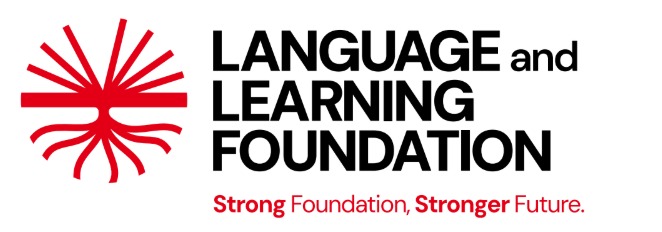Conferences

Envisioning Education in a Digital Society
LLF was at CIES 2025, joining experts from across the globe to explore multilingual
education, large-scale system change, and strategies for improving foundational
learning in resource-constrained contexts.
LLF organised key panels and lead critical discussions alongside researchers,
policymakers, and practitioners to examine what works and what doesn’t, in
strengthening education systems.
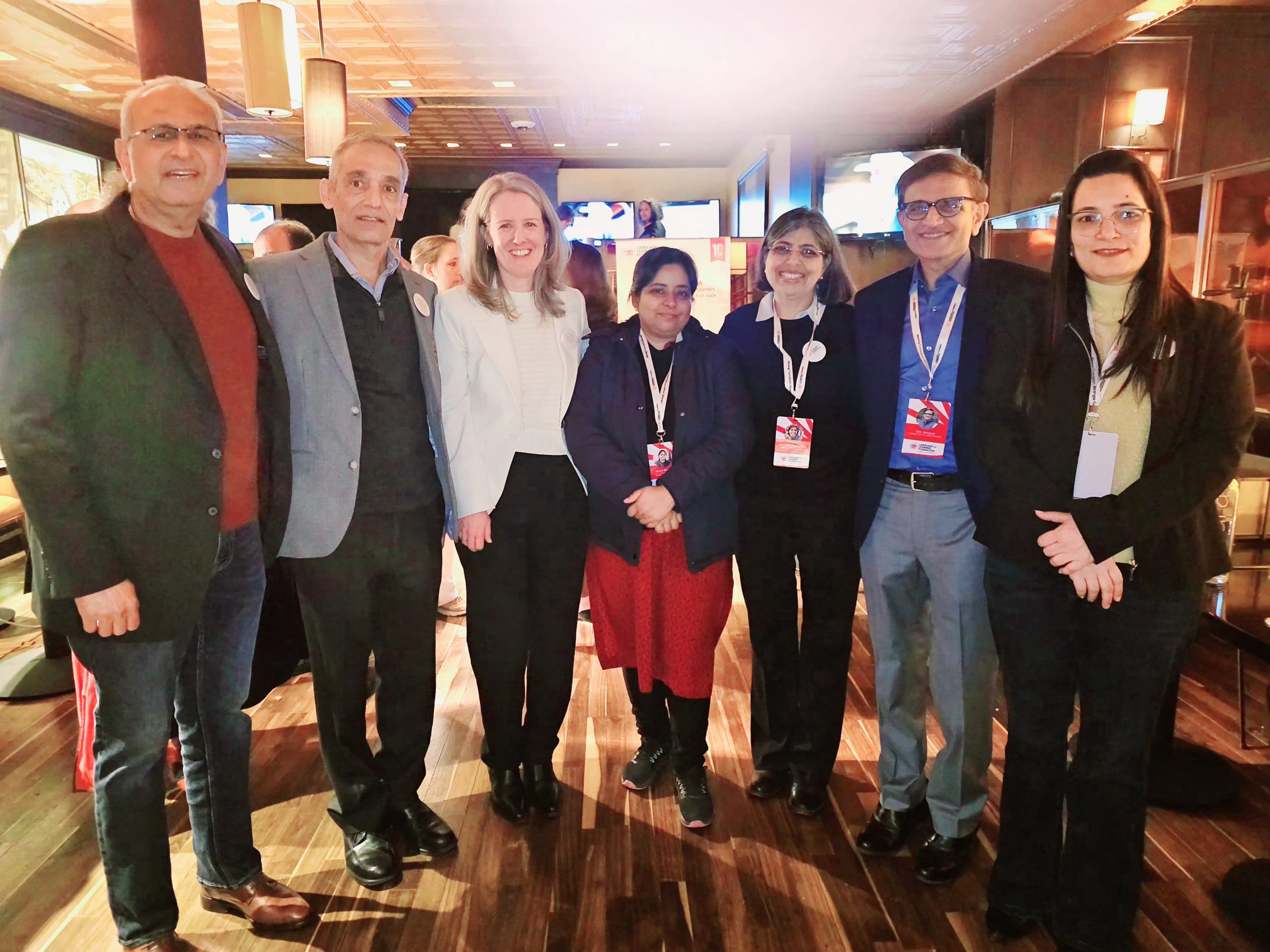
Key Panel Discussions
- Rethinking Multilingual Education in South Asia – What works, and what does not?
- Implementation Science? Decoding the complexity of system change in large-scale
government-nonprofit collaborations
- Leading from the Middle – The role of the middle tier in improving foundational
learning
- Shifting Systems – Contextualized strategies for improving foundational learning
23 March 2025
LLF organised the panel discussion on Rethinking Multilingual Education in South Asia – What Works? And What Doesn’t? sparking a thought-provoking discussion on the challenges and possibilities of multilingual classrooms.
• Barbara Trudell from SIL Africa Learning & Development chairing the panel, emphasised the significance of context, stressing that “policy alignment is key, but execution makes the difference in successful multilingual education.”
• Dhir Jhingran, Founder and Executive Director, Language and Learning Foundation offered a nuanced perspective on South Asia’s linguistic landscape, noting that “languages blend, shift within small distances, and resist fixed labels—posing challenges for education planning.” He highlighted the need to move beyond rigid categorisations and instead embrace a more fluid understanding of language use in education.
• Carol Benson from MLE International, stressed on the importance of focusing on what works, how it works, and in what context, commending LLF and Room to Read for their structured approach to multilingual education in India.
• Smriti Mishra, from Language and Learning Foundation illustrated the richness of India’s linguistic diversity, delving into LLF’s initiatives across states and sharing valuable insights from the organisation’s work.
• Stuti Jain from Room to Read reinforced the necessity of designing programmes with children at their core, ensuring that literacy gains are both meaningful and sustainable in their linguistic and cultural contexts.
• Prem Phyak from Teachers College, Columbia University University, provided a critical examination of policy failures in Mother Tongue-Based Multilingual Education (MTB-MLE) in Nepal, offering key lessons for future approaches.
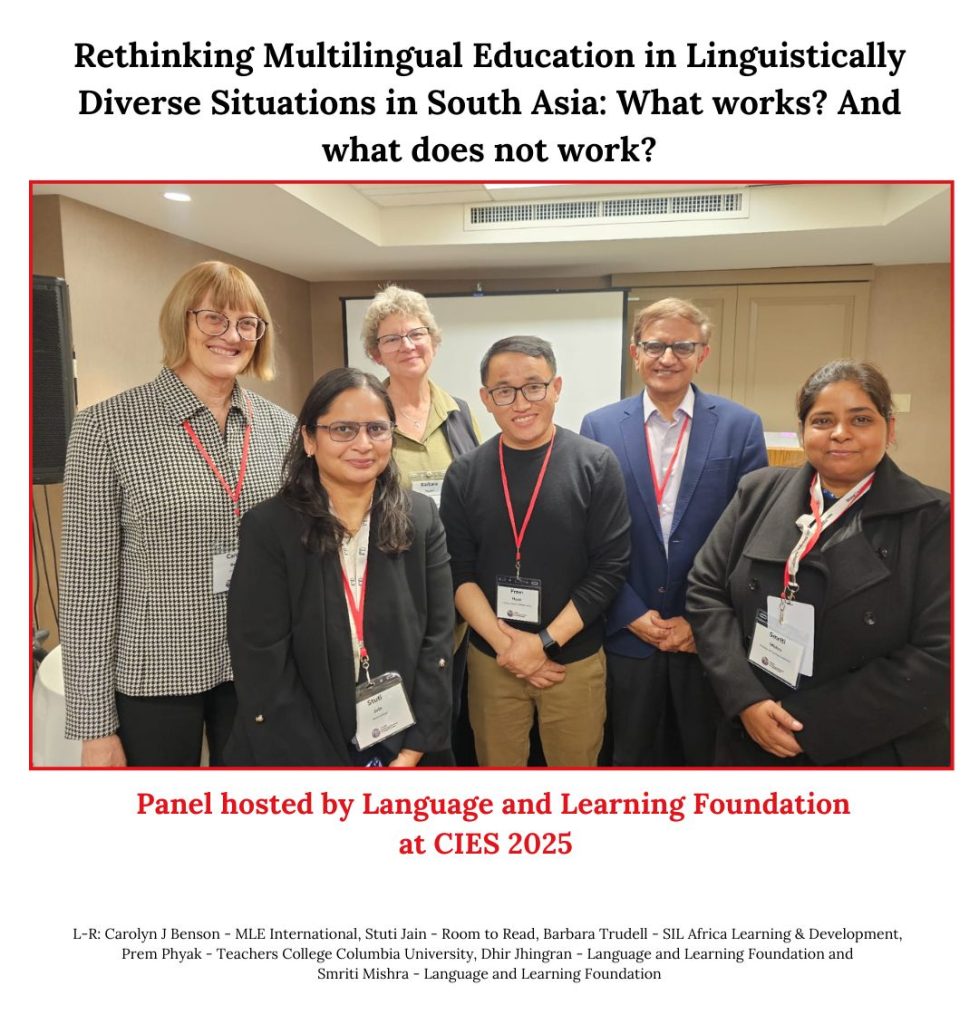
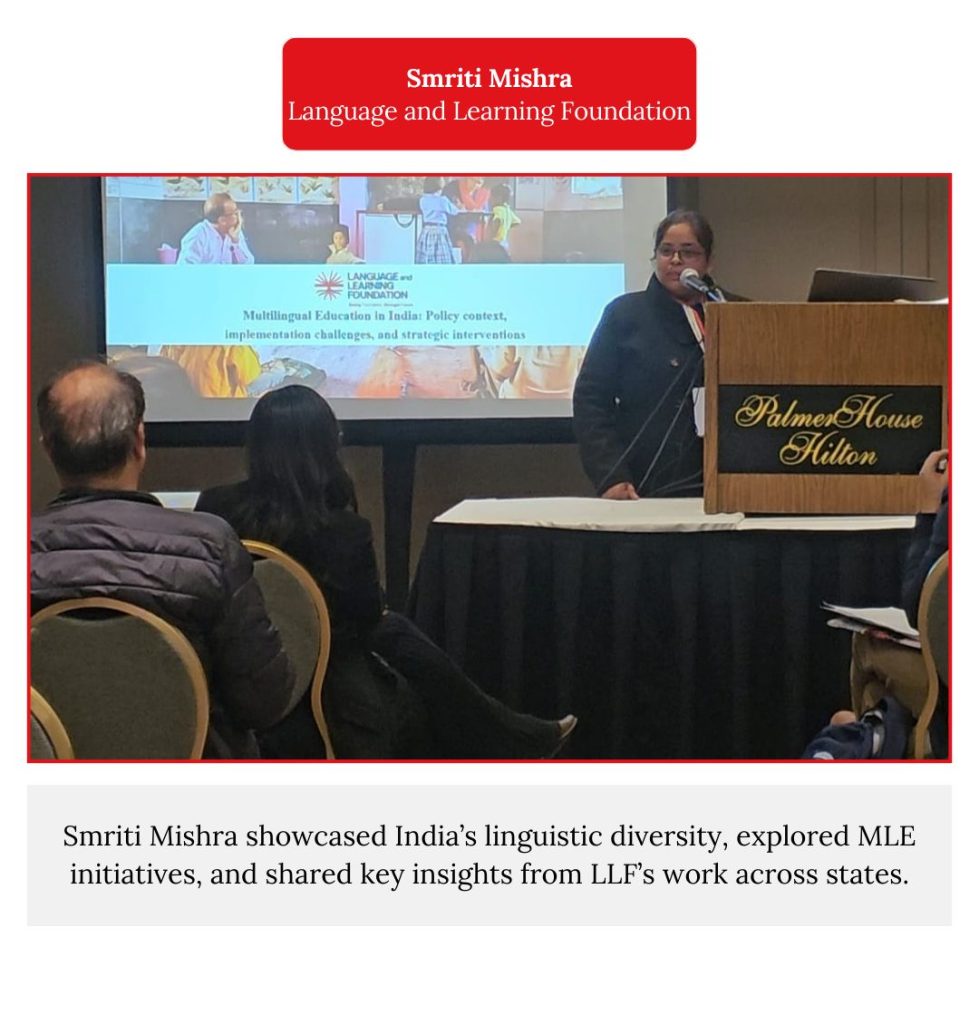
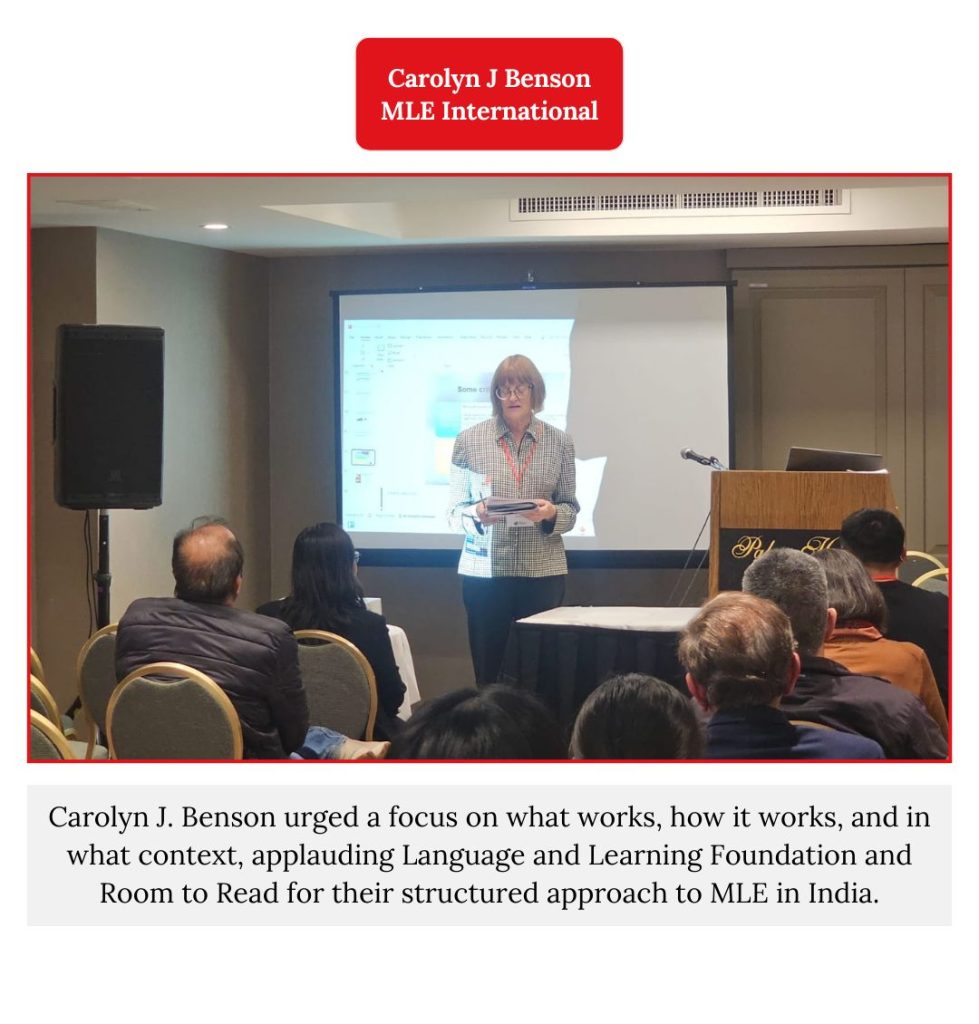
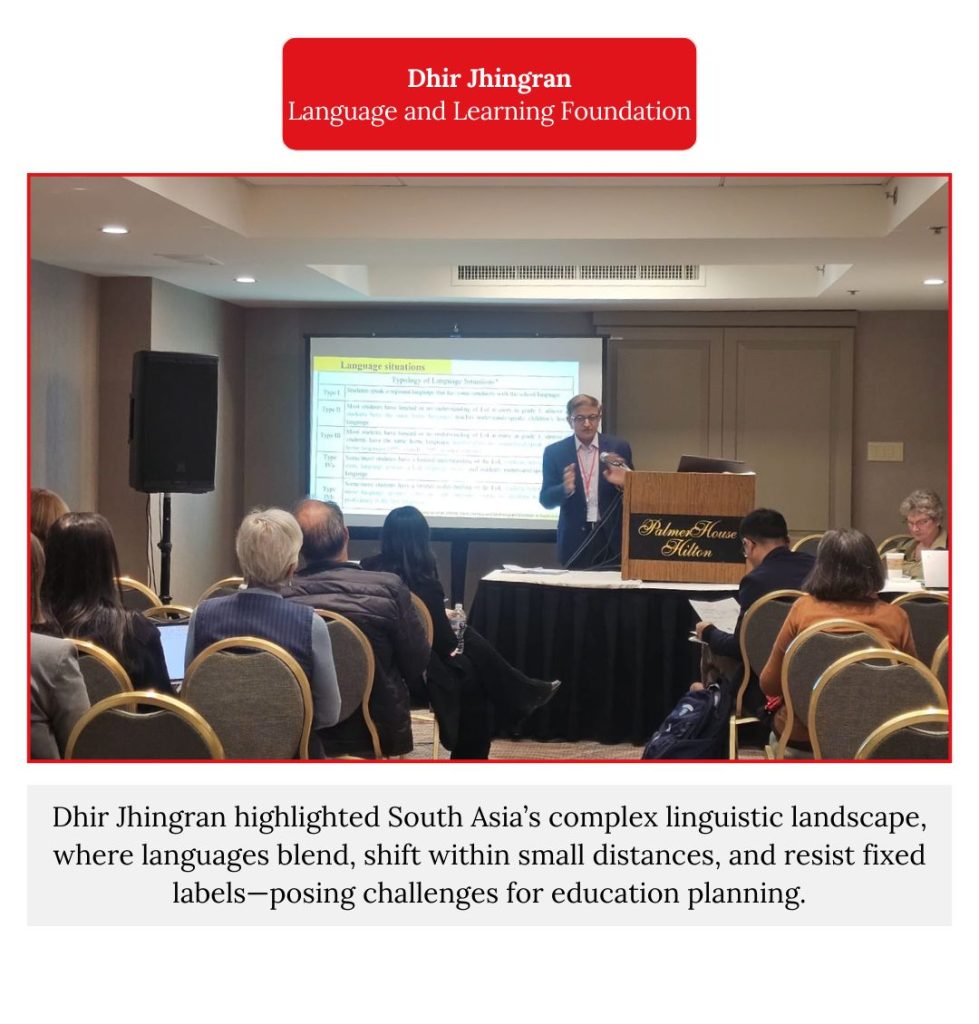
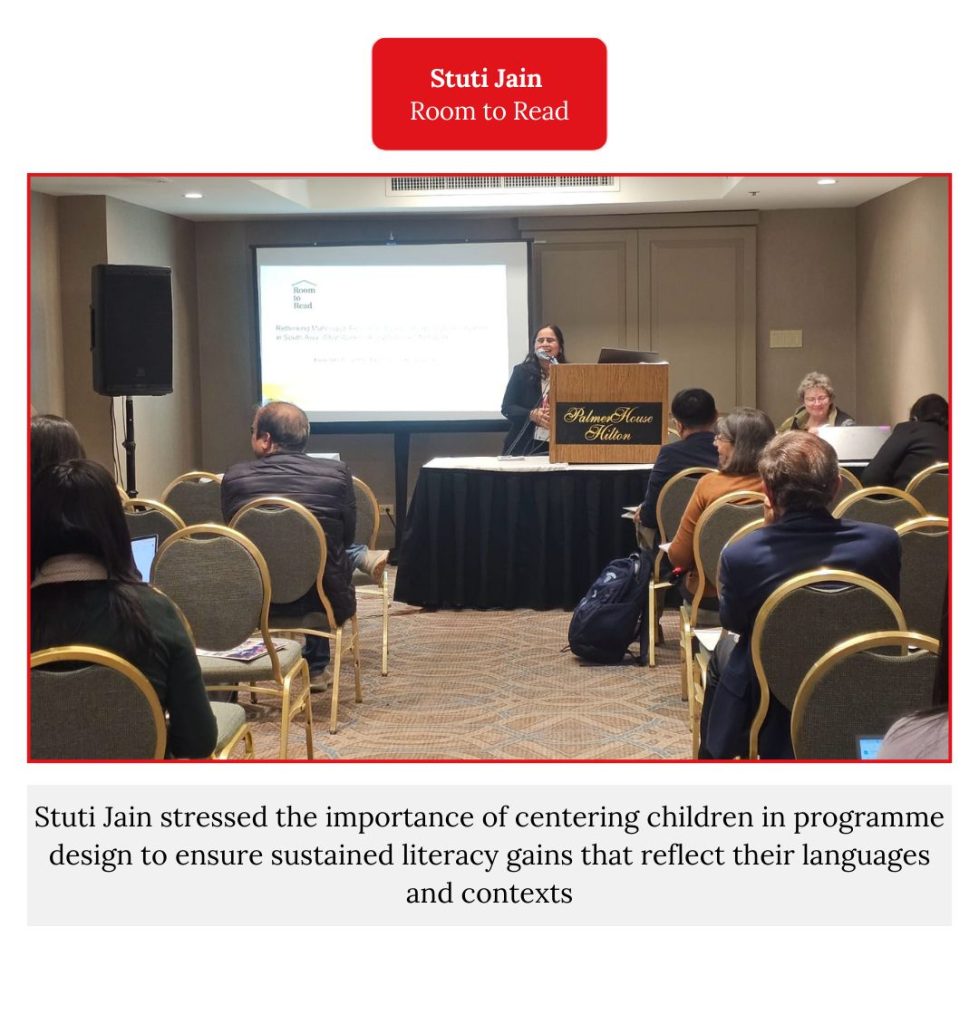
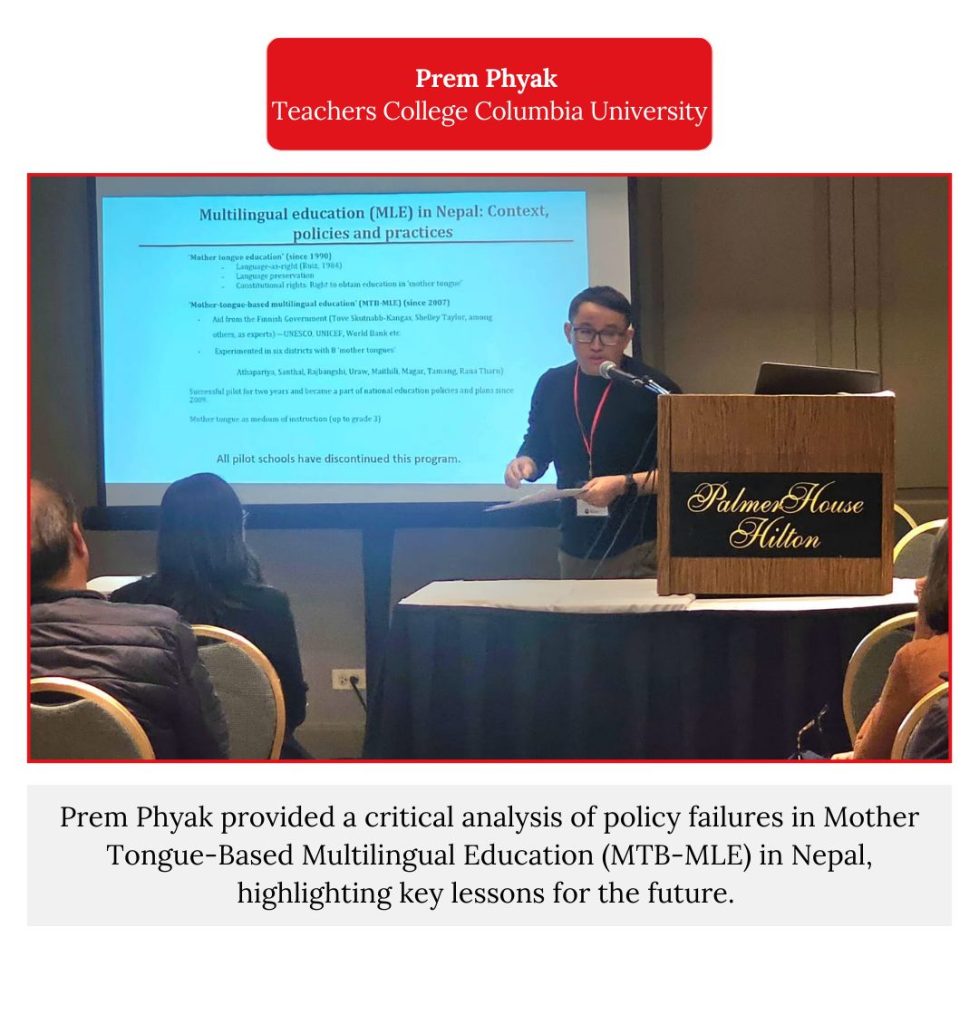
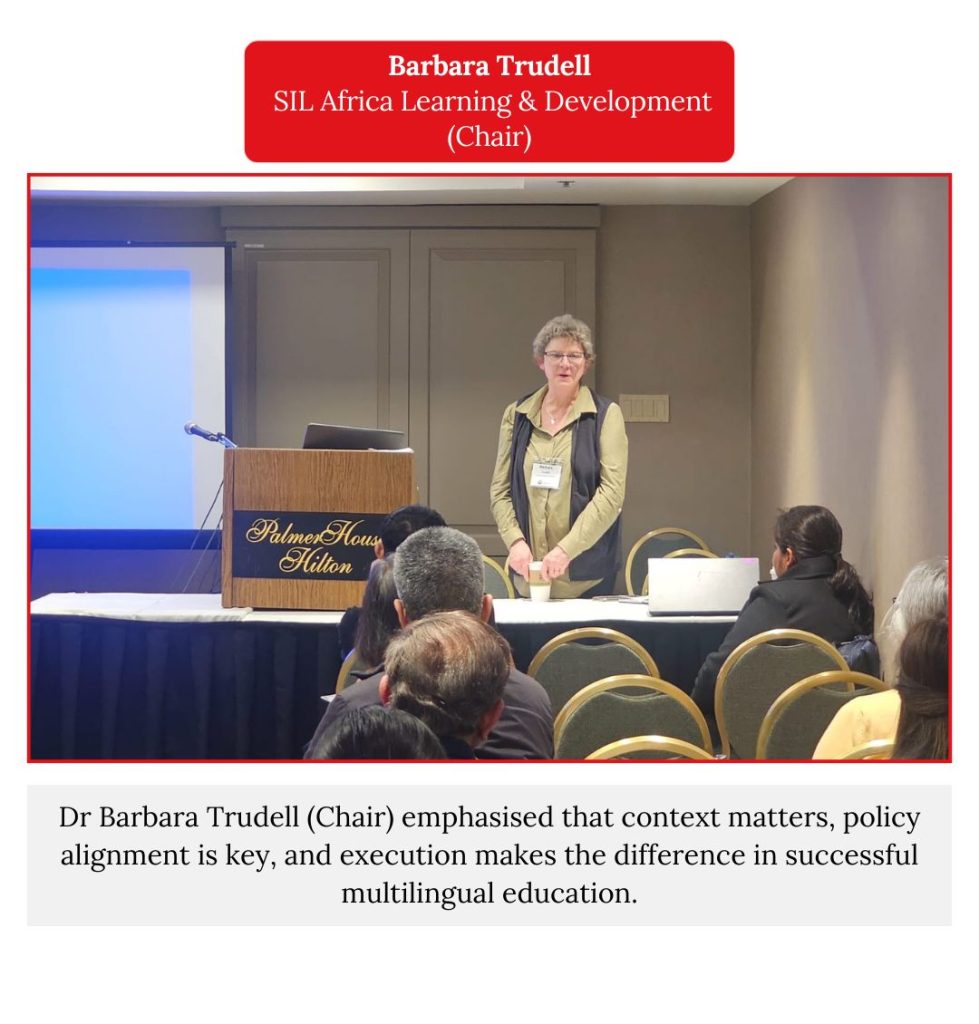
The discussion reaffirmed the need for multilingual education policies that are deeply contextual, effectively implemented, and aligned with the linguistic realities of learners, while also highlighting both the challenges and opportunities in ensuring inclusive and equitable learning through a powerful exchange of ideas.
24 March 2025
LLF organised a session on Implementation Science? Decoding the complexity of system change in large-scale government-nonprofit collaborations. Chaired by Benjamin Piper, Gates Foundation, the session highlighted key lessons from India’s education reform journey.
– Dhir Jhingran, Language and Learning Foundation highlighted that system change takes time, requiring co-creation with governments, decentralised decision-making, and strategies to scale FLN across 30 million students in 10 states.
– Rukmini Banerji, Pratham Education Foundation emphasised shifting from ‘Catch Up’ to ‘Leap Forward’, leveraging Teaching at the Right Level (TaRL) and ASER assessments to drive partnerships for better learning outcomes.
– Shaveta Sharma-Kukreja, Central Square Foundation highlighted NIPUN Bharat’s ₹13,000 crore investment in FLN, stressing the need to go beyond compliance and drive behavioural change in the education system.
– Dr Parmod Kumar Kumar, State Programme Officer, Department of School Education, Government of Haryana, India, showcased how NIPUN Haryana is setting a benchmark in FLN transformation across 8,663 primary schools, with technology-driven tracking, structured pedagogy, and 35,755 empowered teachers. A model for scalable impact!
– Noam Angrist, Youth Impact; What Works Hub for Global Education, University of Oxford introduced an innovative real-time evaluation method for scaling interventions, ensuring cost-effective, evidence-based policymaking. A game-changer for global education research.
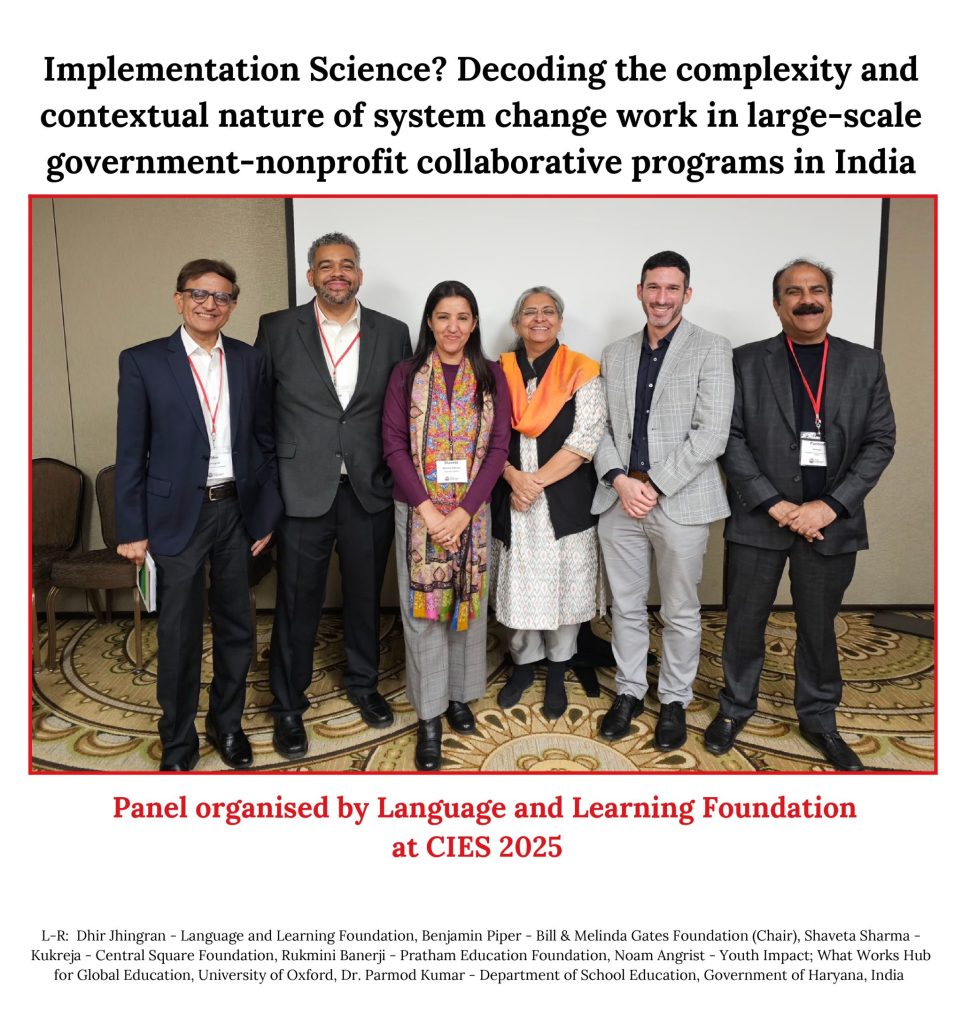
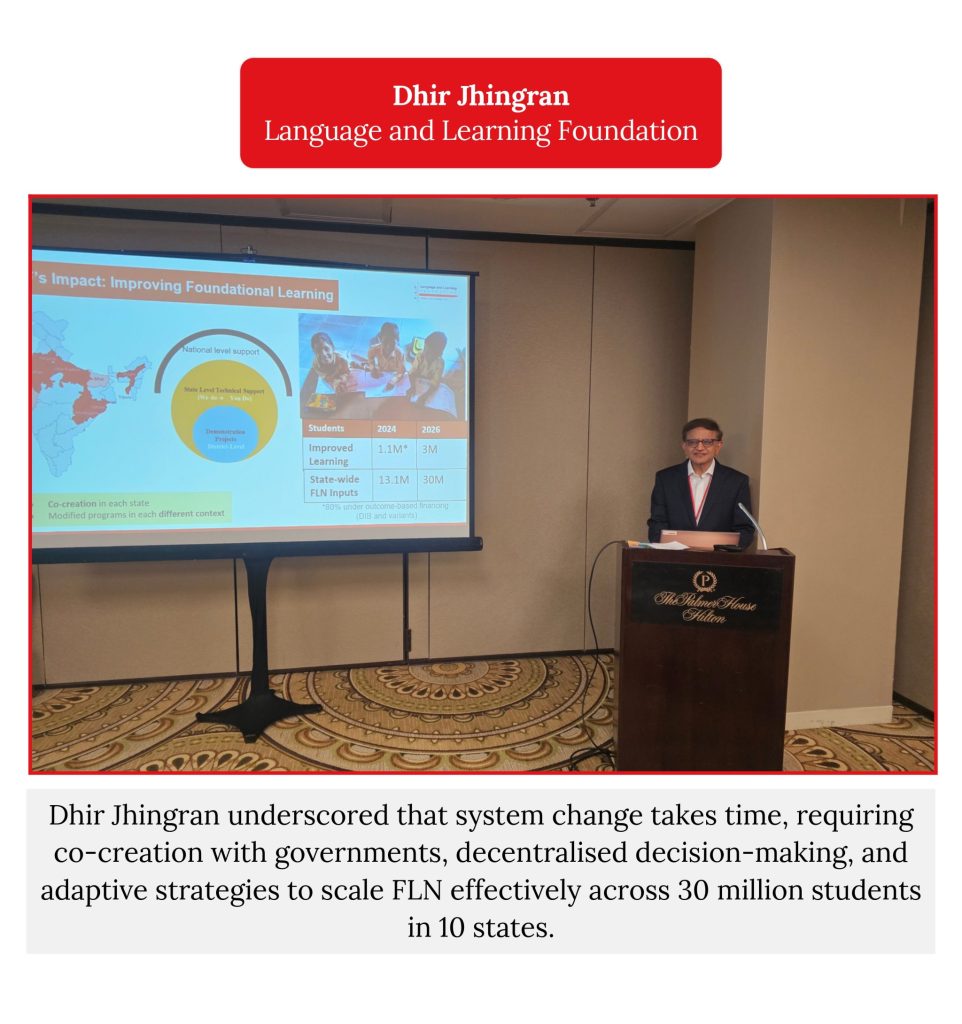
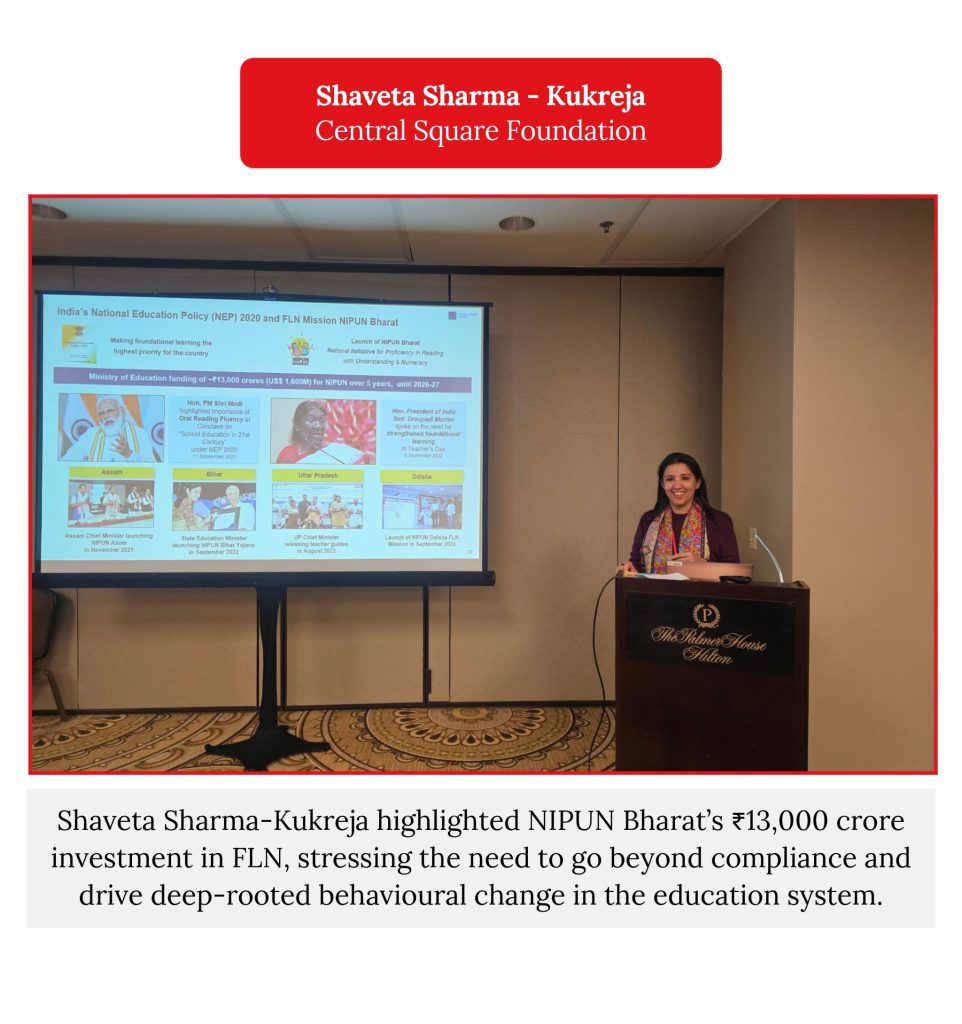
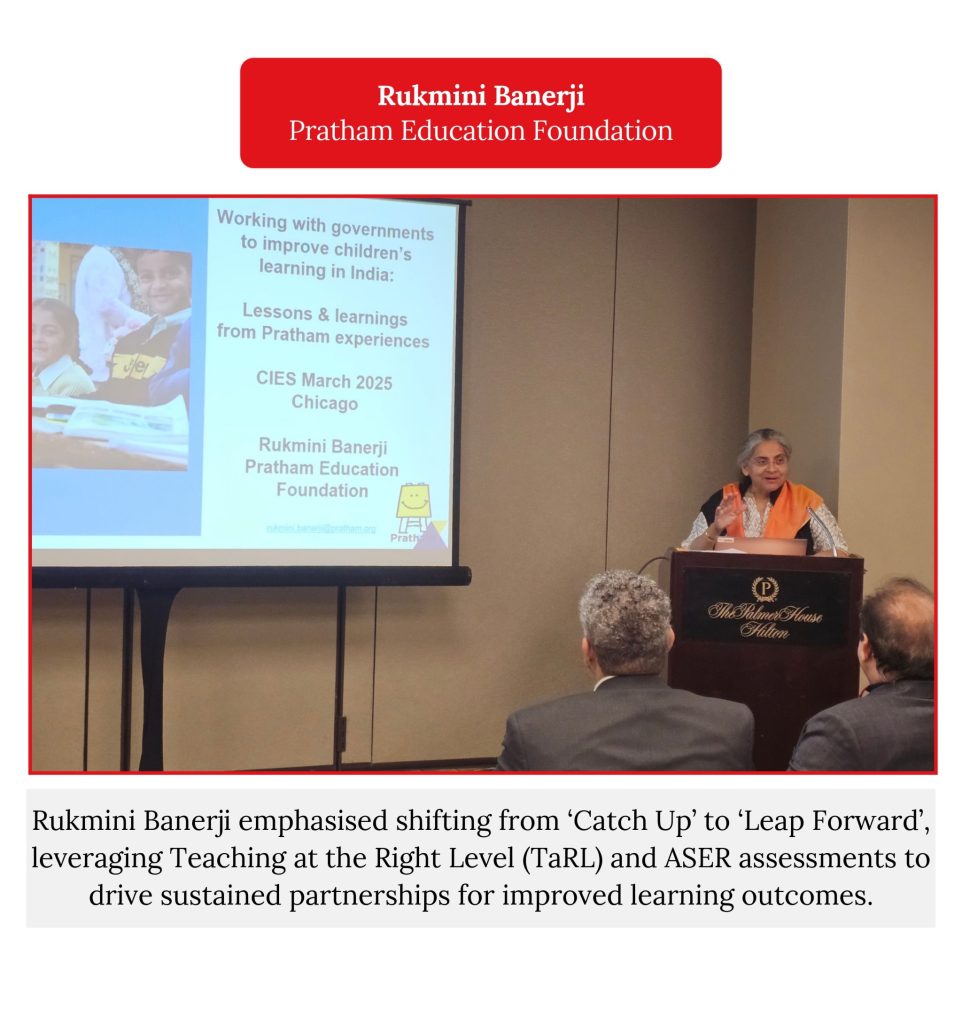
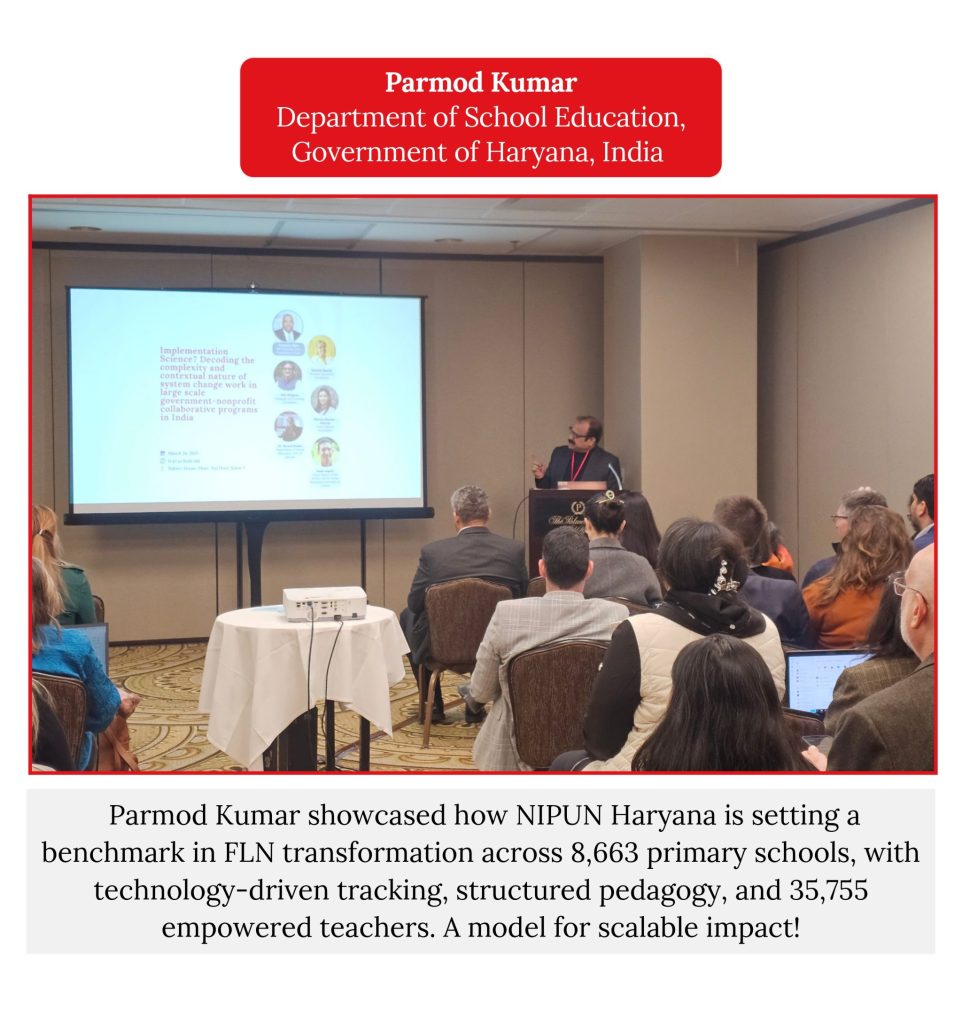
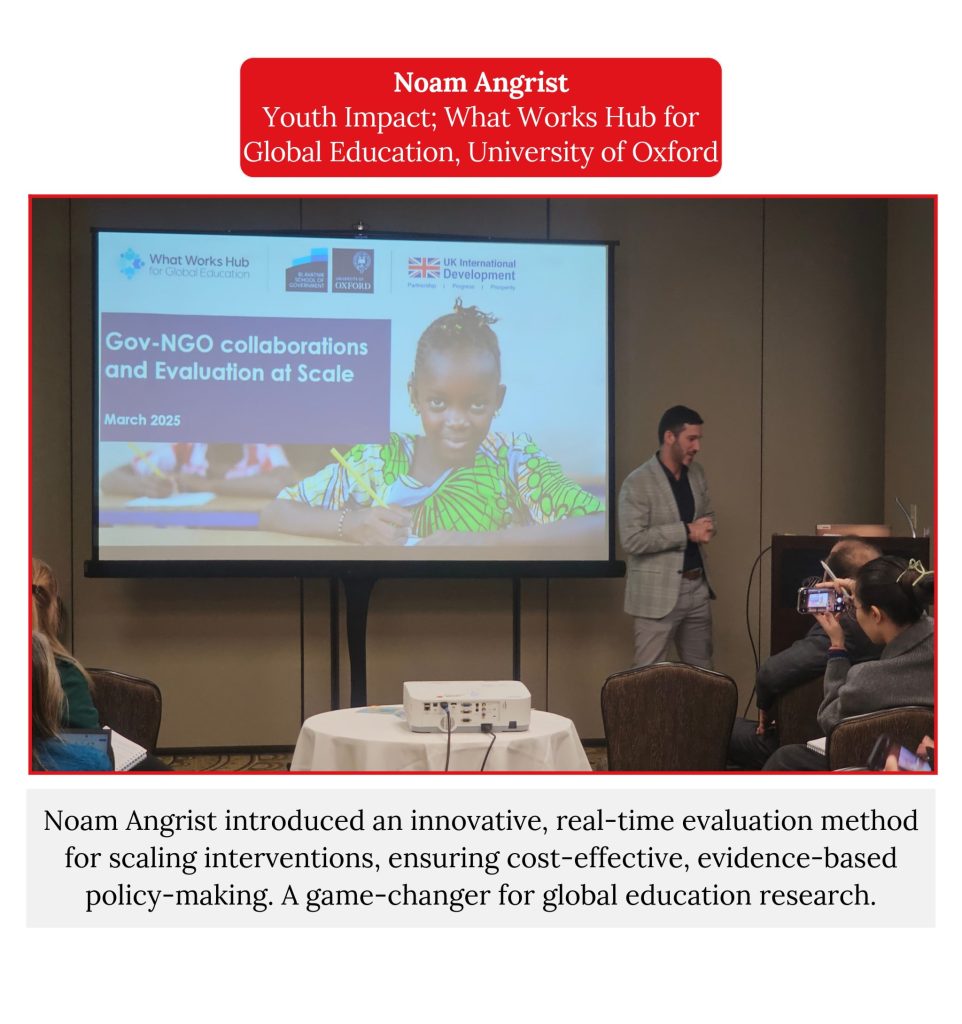
The session reinforced that scaling education reform isn’t just about expansion—it’s about sustained, adaptive, and data-driven implementation. India’s FLN journey is setting the stage for systemic transformation at scale.
25 March 2025
In a panel discussion titled Leading from the Middle: New Evidence on Strengthening the Middle Tier for Foundational Learning, experts discussed the critical role of the middle tier in improving foundational learning outcomes. Chaired by Joseph DeStefano, RTI International, the session explored insights from India, Ghana, and Rwanda on how strengthening district and sub-district leadership can drive systemic education reform.
– Shveta Lall (Lakhanpal), Language and Learning Foundation, highlighted the need to strengthen India’s middle tier, particularly teacher mentors, to bridge gaps in reaching every teacher. She shared LLF’s work, insights from a diagnostic study with CSBC, Ashoka University, and a needs analysis across three states, emphasising that scaling this effort requires collaboration.
– Clio Dintilhac, BMGF, emphasised that strengthening the middle tier’s instructional role requires aligning schools, teacher support, district leadership, and national institutions. She highlighted the need for a shift from ‘business as usual’ to an evidence-based approach, optimising feedback between teachers and district support.
– Christine H. Beggs, Alternatives in Development, study of top Rwandan districts reveals key drivers of literacy: strong leadership, teacher support, community engagement, and active monitoring. These districts prioritise progress, ensuring effective teaching and sustained learning.
– Sheena Bell’s, O.I.S.E. University of Toronto, research explores why Ghana’s district education offices differ despite a centralised system. She highlights how leadership, local contexts, and resources shape decisions, stressing the need to strengthen middle-tier leadership for better learning outcomes.
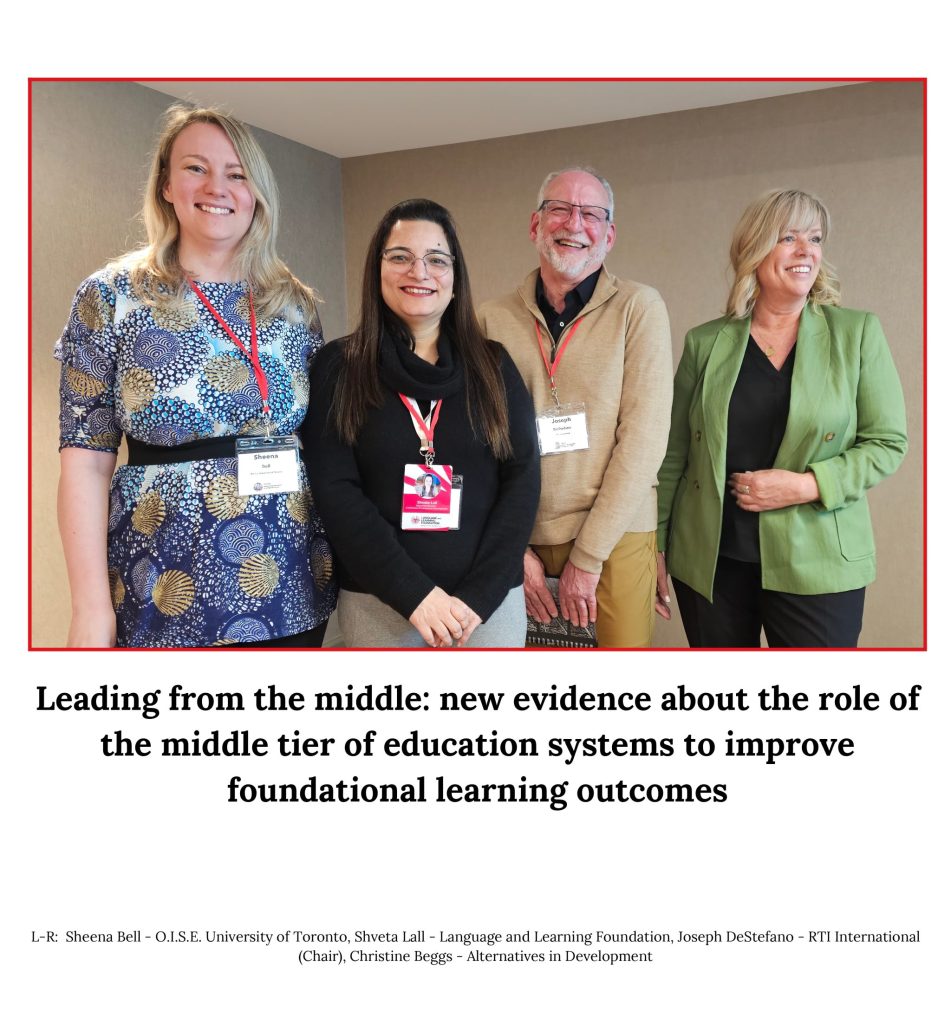
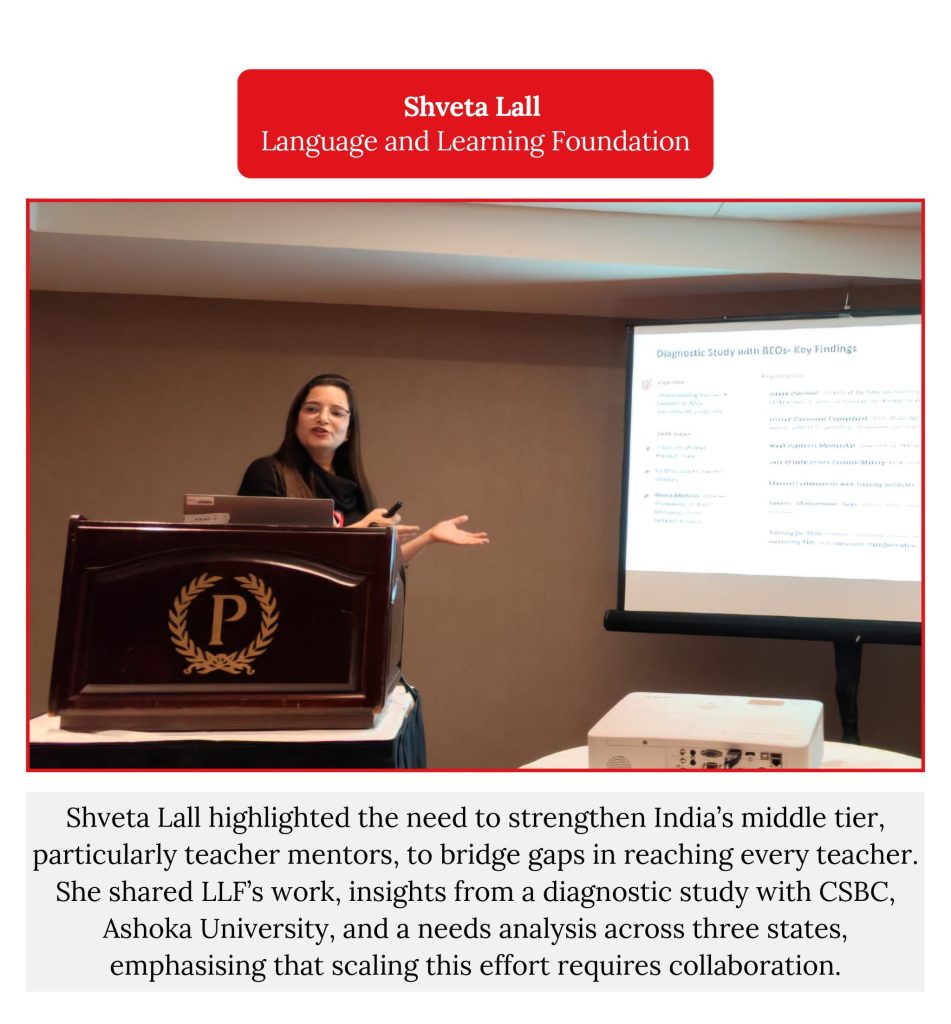
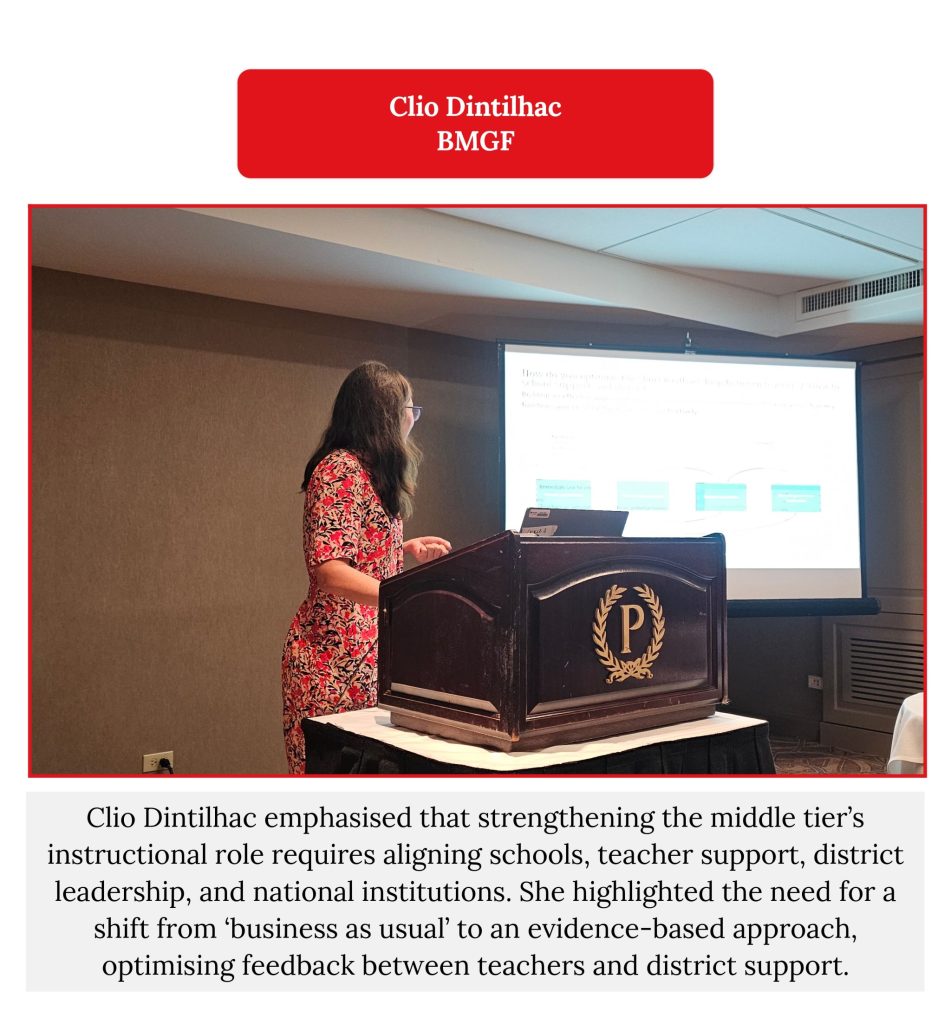
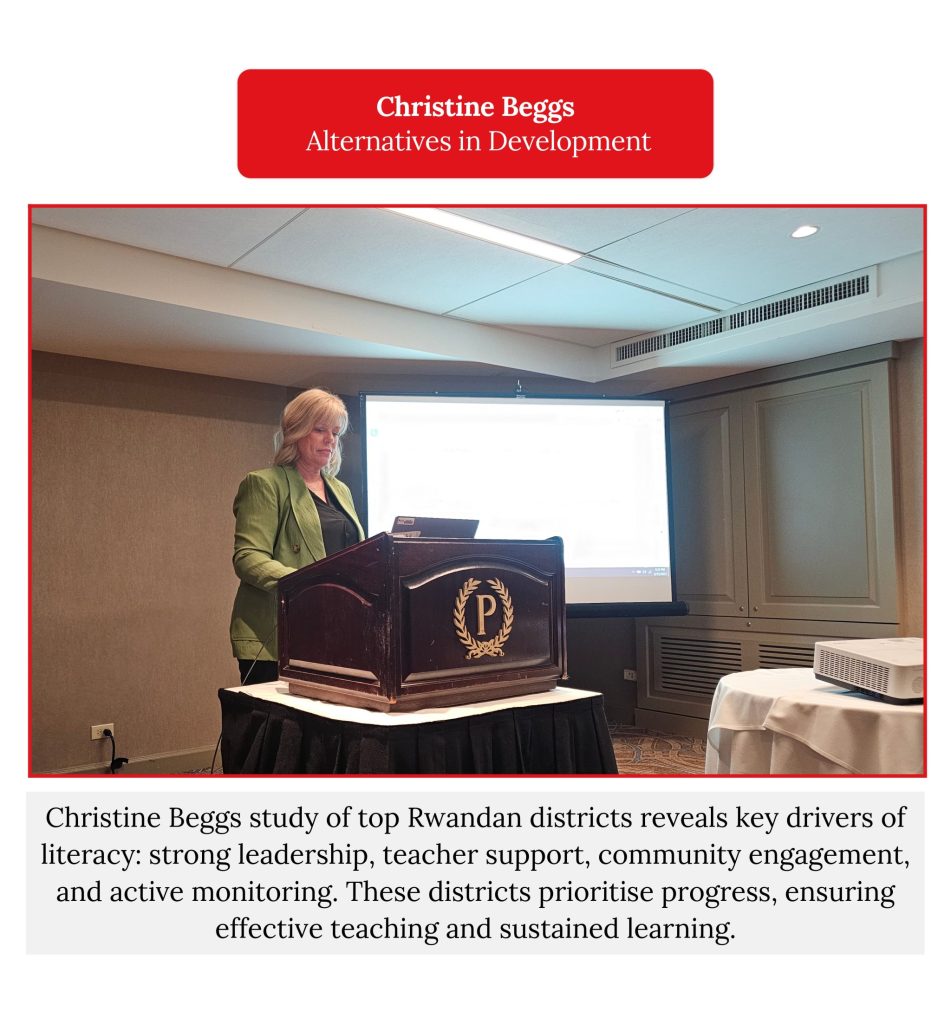
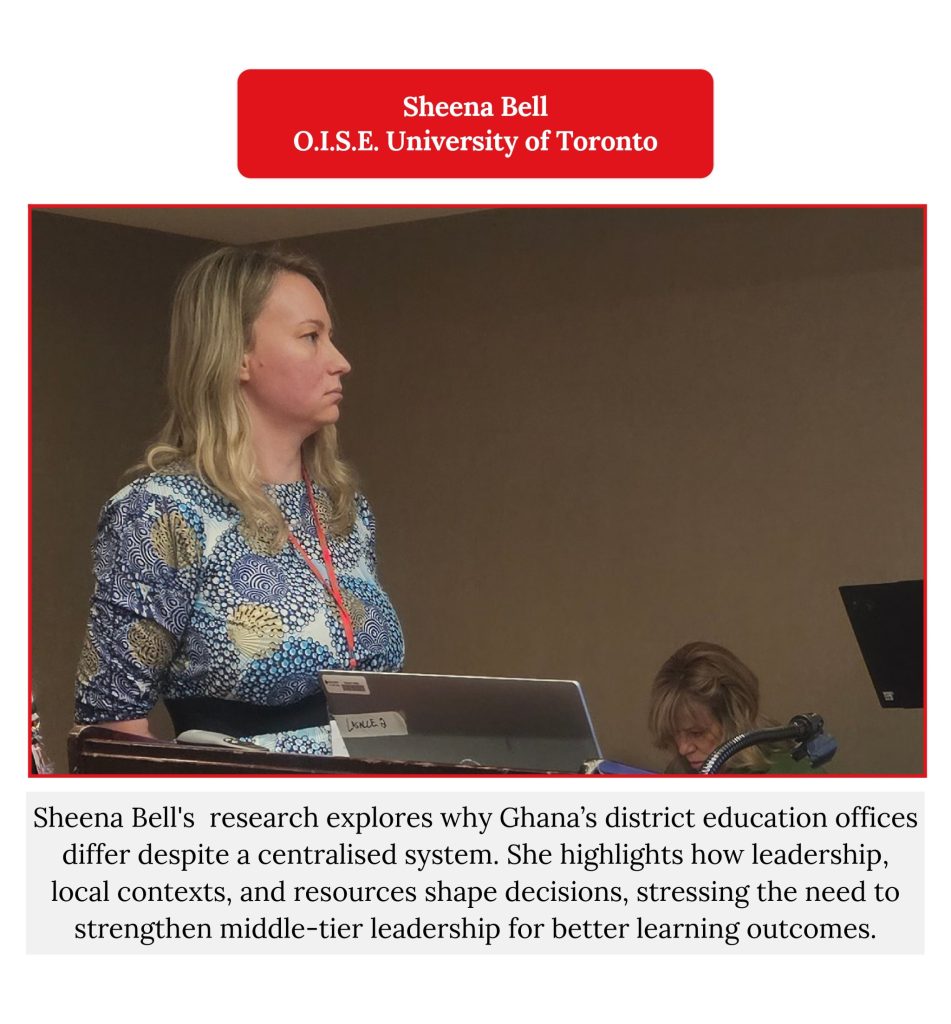
The panel discussion reinforced that investing in middle-tier leadership is key to lasting education reform. Strengthening district- and block-level structures ensures that teaching and learning improvements reach every classroom, making large-scale impact possible.
26 March 2025
LLF organised a panel discussion on Shifting Systems: Comprehensive and Contextualised Strategies for Improving Foundational Learning in India. Chaired by Dr Asiya Kazmi, OBE, Gates Foundation, the session brought together key voices to discuss government-NGO collaboration, structured pedagogy, multilingual education, and systemic teacher support as pathways to driving sustainable education reform. The experts on the panel examined scalable, system-driven strategies to improve Foundational Literacy and Numeracy (FLN) in India.
– Dhir Jhingran, Language and Learning Foundation, highlighted India’s FLN policy recommendations, LLF’s collaboration with state governments, and the importance of a multilingual approach. He emphasised that strong relationships, trust, and alignment with government priorities drive systemic change.
– Dr Parmod Kumar, Department of School Education, Government of Haryana, India, shared how Haryana’s NIPUN Haryana Mission is improving FLN through structured pedagogy, targeted teacher support, and data-driven academic reviews. He outlined the mission’s seven key work streams aligned with NIPUN Bharat and the state’s ICT-based monitoring system for tracking progress.
– Sanyukta Chaturvedi, Language and Learning Foundation, discussed LLF’s large-scale demonstration programmes, which focus on enhancing teaching practices and improving learning outcomes. She highlighted key levers of change and how providing sustained support to teachers leads to better teaching-learning practices.
– Shveta Lall (Lakhanpal), Language and Learning Foundation, spoke about the critical role of teacher mentors in strengthening India’s education system. She highlighted LLF’s insights into the challenges faced by mentors and the need for a collaborative approach to scale middle-tier interventions effectively.
– Dan Wagner, University of Pennsylvania, closed the session by stressing the role of motivation in achieving systemic change. He emphasised that engaging and inspiring teachers, administrators, and policymakers is key to improving foundational learning outcomes and building a more transparent and effective education system.
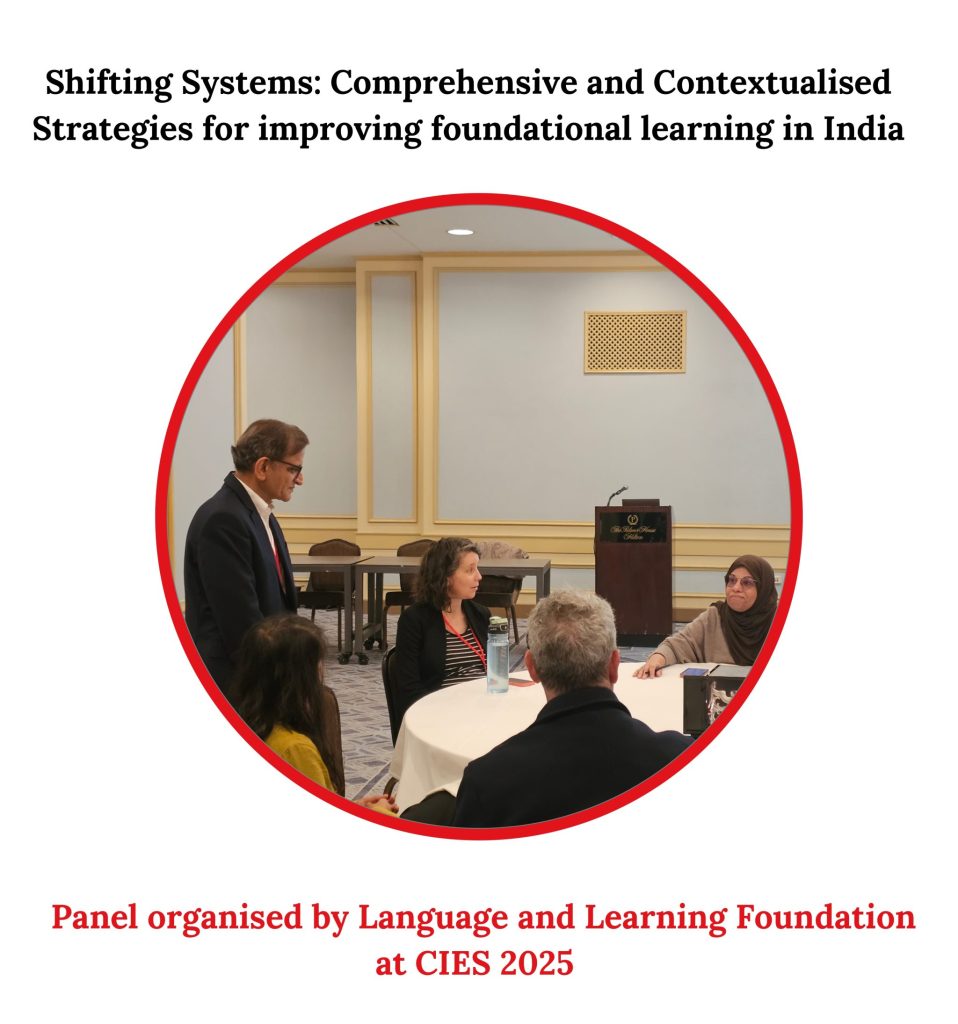
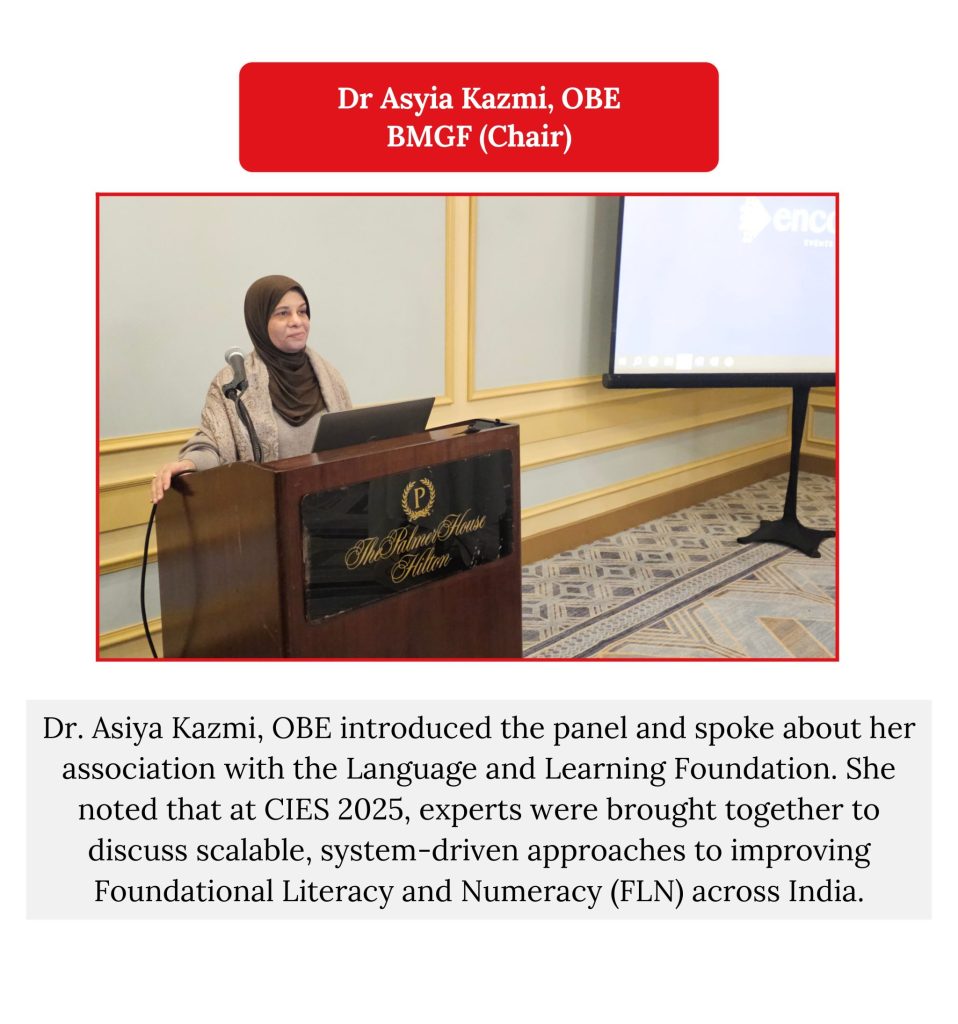
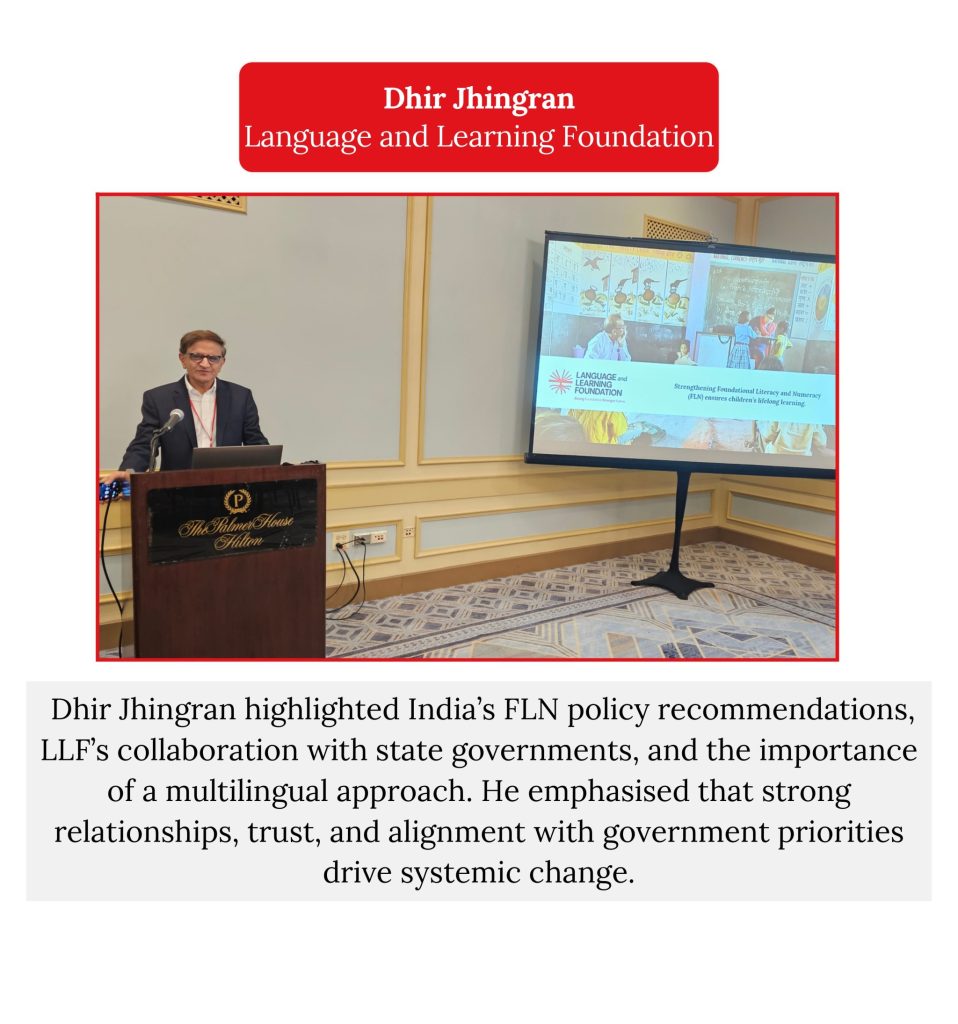
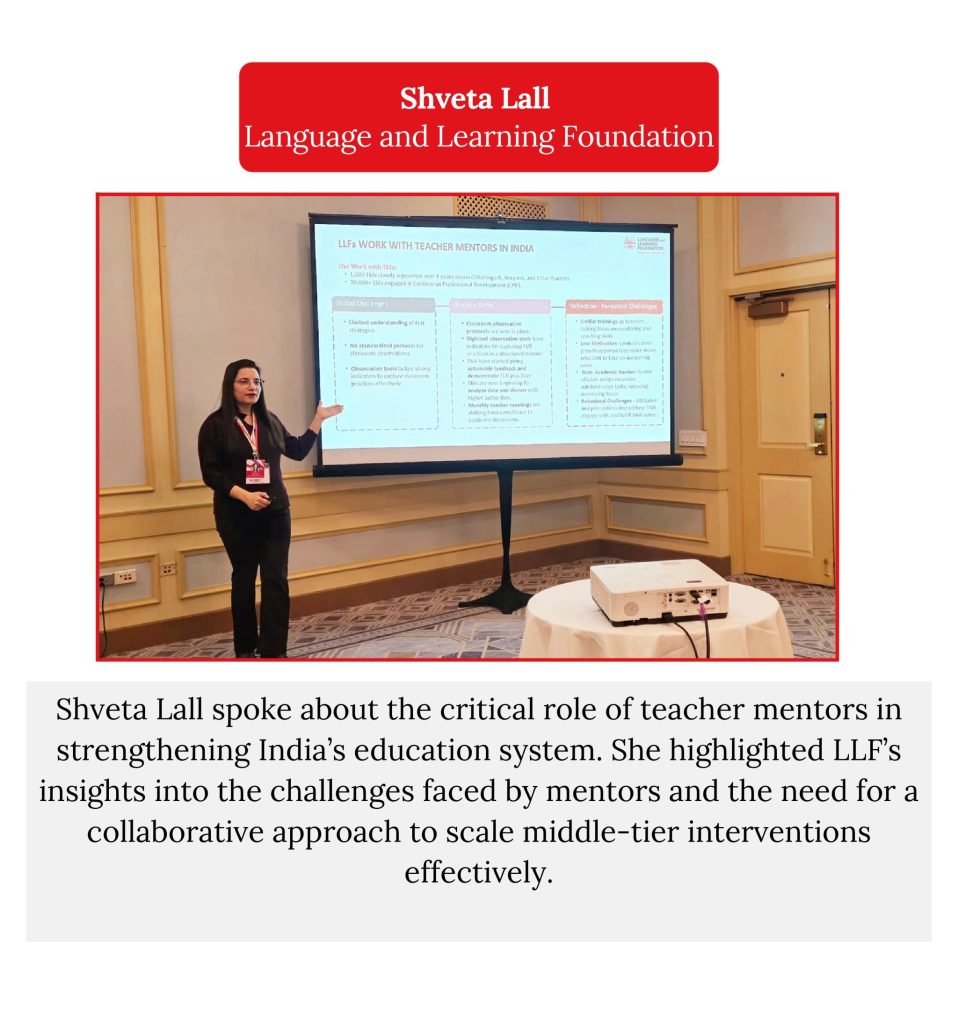
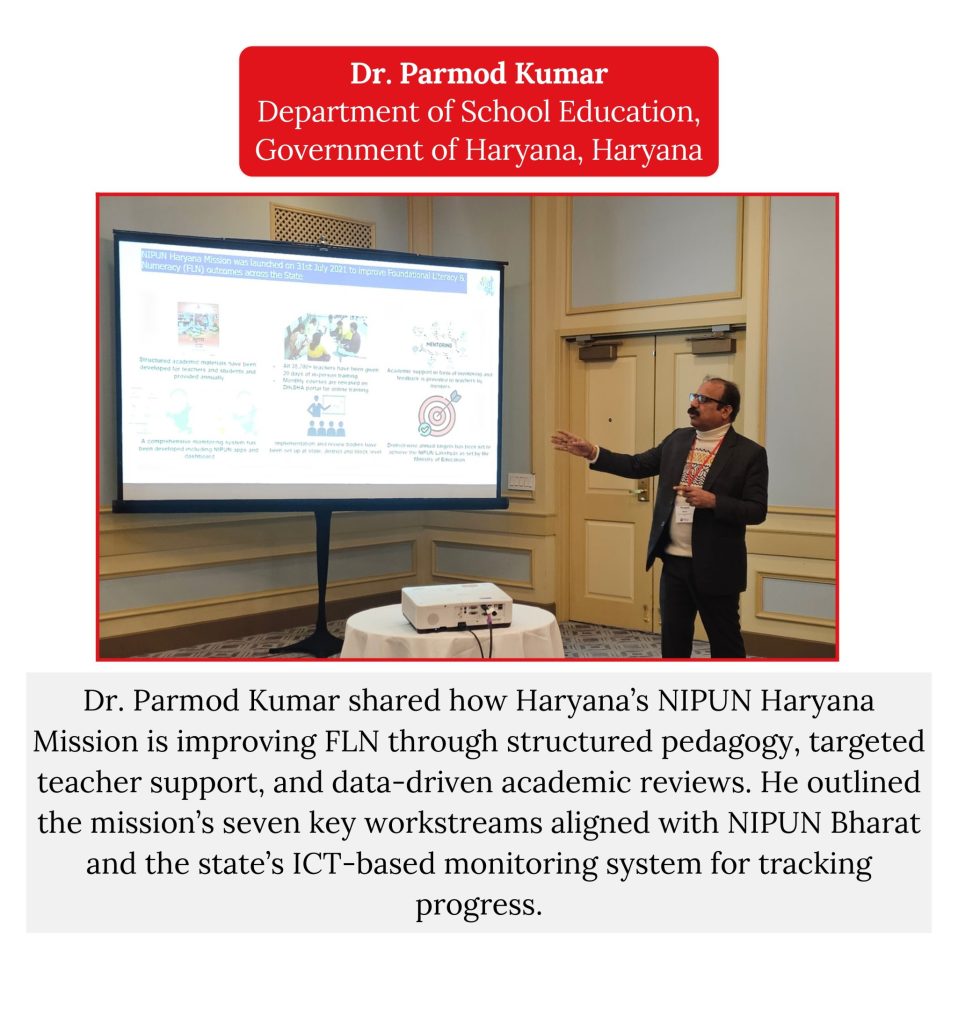
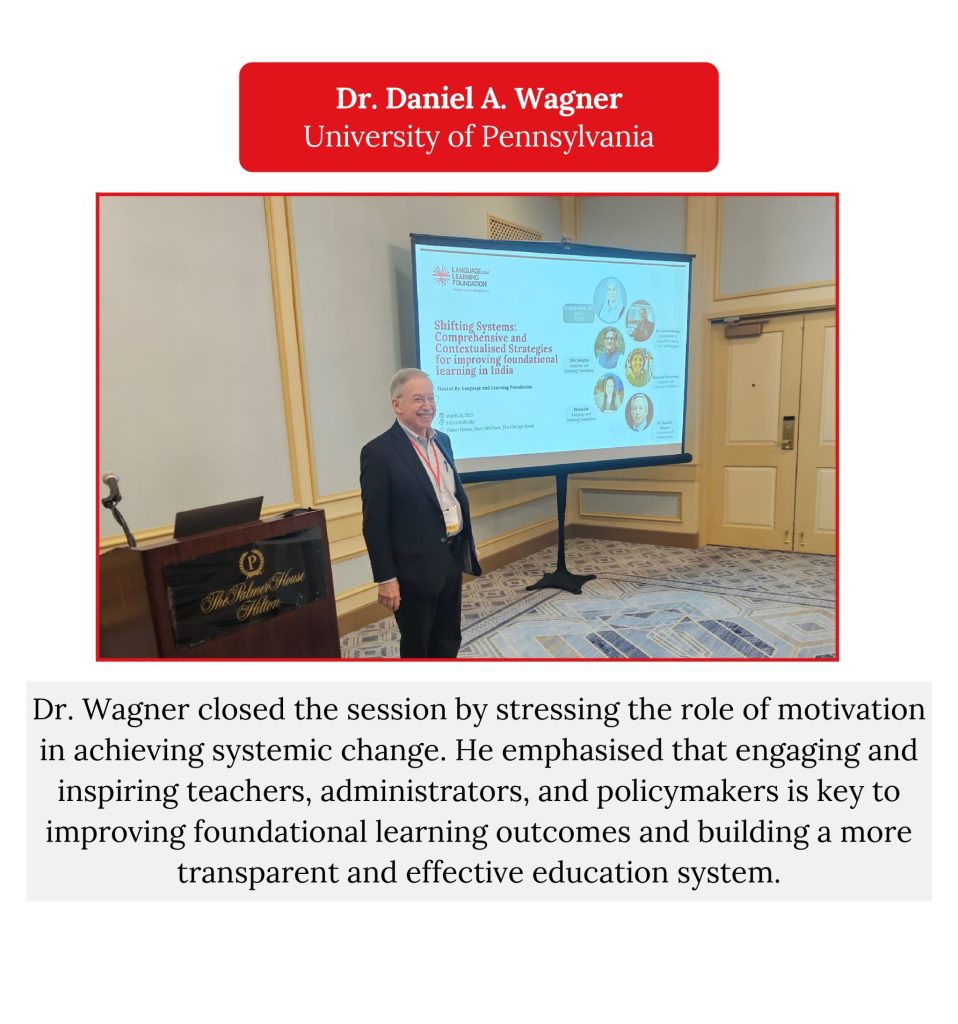
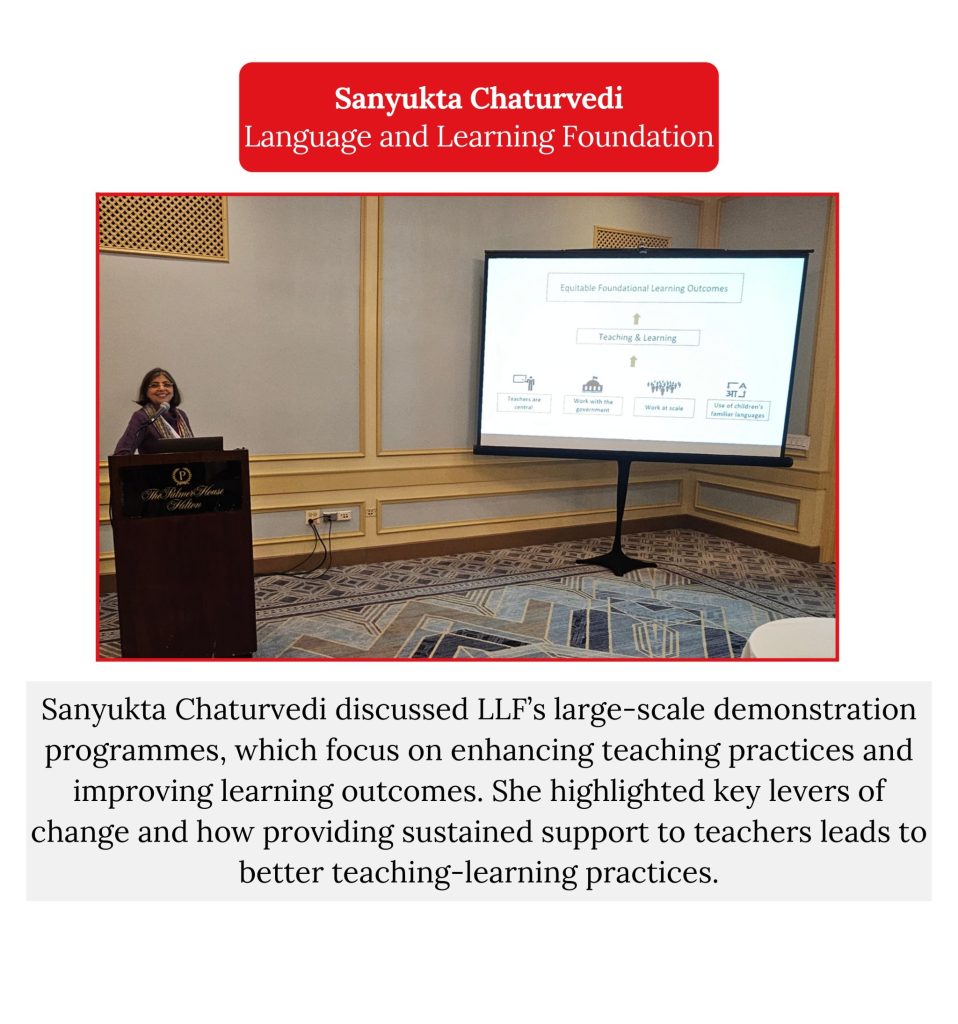
The discussion reinforced that contextualised, system-wide strategies are crucial for improving foundational learning at scale. By fostering collaboration, embedding multilingual approaches, and strengthening teacher support structures, India can drive sustainable improvements in FLN.
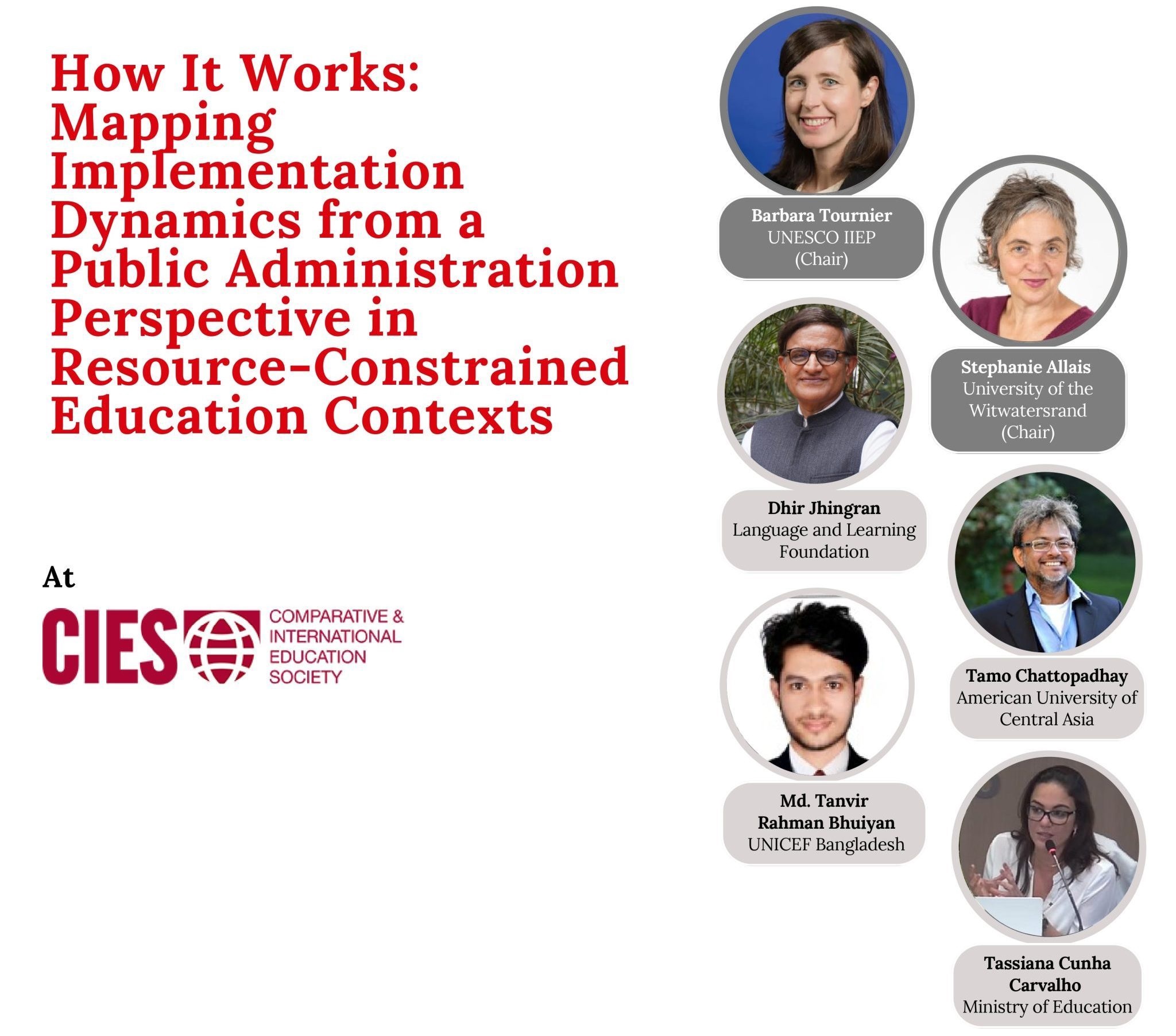
Education systems worldwide are dynamic and face implementation challenges. LLF contributed to a roundtable on Navigating Systemic Change in Education: Insights from Diverse Contexts. It was about large-scale education reform through government-nonprofit collaboration in India. This session applied a public administration lens to policy implementation across Latin America, Africa, and South Asia, exploring how context-driven, systemic approaches can drive real impact at scale.
Based on experience in eight Indian states, LLF shared key learnings on what works (and what doesn’t) in implementing high-quality FLN programmes.
Panelists:
– Barbara Tournier, International Institute for Educational Planning (IIEP-UNESCO) (Chair)
– Stephanie Allais, University of the Witwatersrand (Chair)
– Dhir Jhingran, Language and Learning Foundation (LLF), India
– Md. Tanvir Rahman Bhuiyan, UNICEF Bangladesh
– Tassiana Cunha Carvalho, Brazilian Federal Ministry of Education
– Tamo Chattopadhay, American University of Central Asia (AUCA)
LLF won the CIES South Asia SIG Best Field-based Initiative Award for our submission: ‘Multilingual Education in Chhattisgarh: Improving Foundational Learning Outcomes by Inclusion of Children’s Home Languages.’
This award recognises our efforts to promote equity, cultural inclusion, community partnerships, and sustainable project design in education.
In Bastar, Chhattisgarh, a tribal-dominated district where only 5% of children entering Grade 1 speak Hindi—the official medium of instruction in schools—LLF’s Multilingual Education (MLE) Programme has been bridging this linguistic gap since 2022. Starting with Halbi, the home language of nearly 50% of Grade 1 students, the programme has expanded to include Bhatri and Gondi, fostering a more inclusive learning experience.
More than just language, the Bastar MLE Programme integrates community knowledge and a culturally responsive curriculum, ensuring meaningful learning. Its success is driven by need-based teacher training, capacity building of teacher educators, and the deep field insights of our dedicated team.
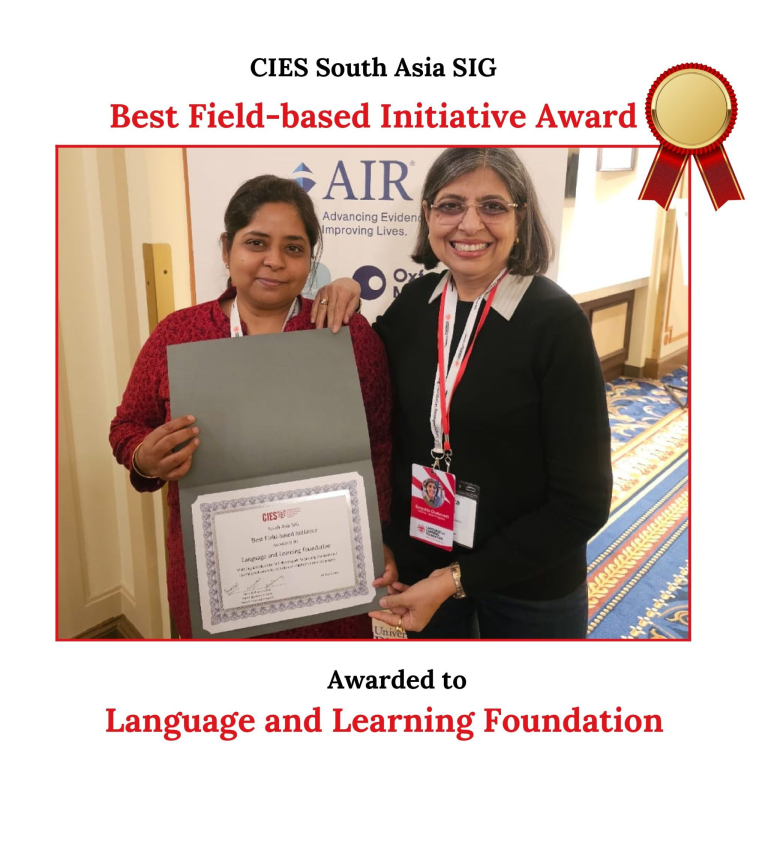
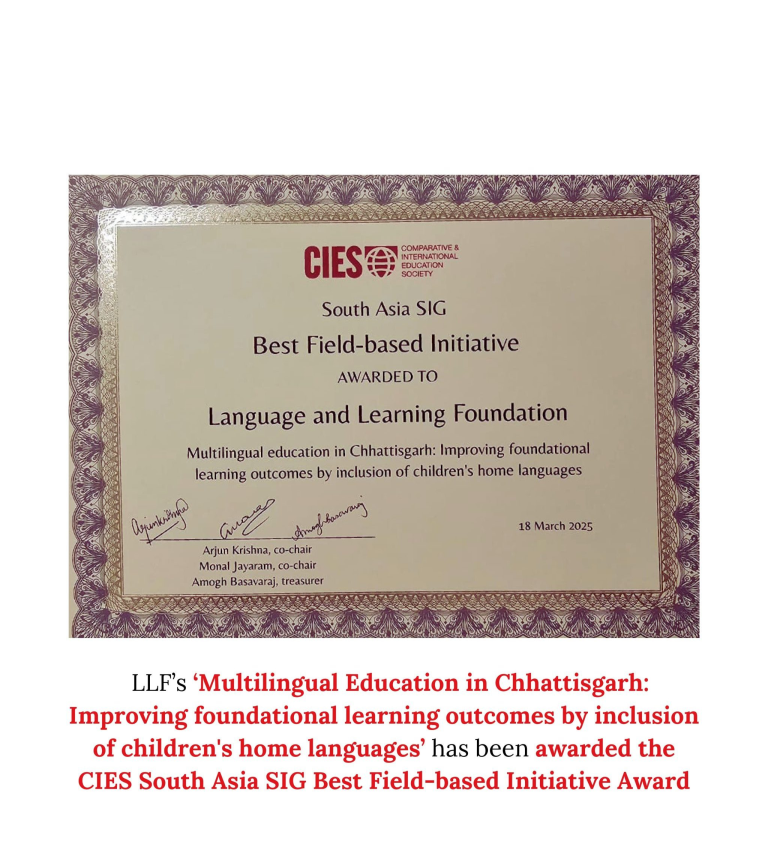
Leading from the Middle: New Evidence on Strengthening the Middle Tier in Education
How can effective leadership and support from the middle tier of education systems drive sustained improvements in foundational learning outcomes?
At CIES 2025, LLF joined a panel of global experts to explore the evolving role of the middle tier in education systems. With insights from research and implementation in India, Ghana, Rwanda, and other regions, this discussion addressed critical evidence gaps and highlight effective strategies for empowering the middle tier to improve instructional quality and student learning.
Key Discussions Included:
– Research on district education offices in Ghana and their impact on instructional support
– Insights from a middle-tier study in Rwanda using social network analysis and time-use research
– Findings from applied research in three Indian states on strengthening Teacher Mentors
– A provisional theory of change for the middle tier’s role in improving learning outcomes
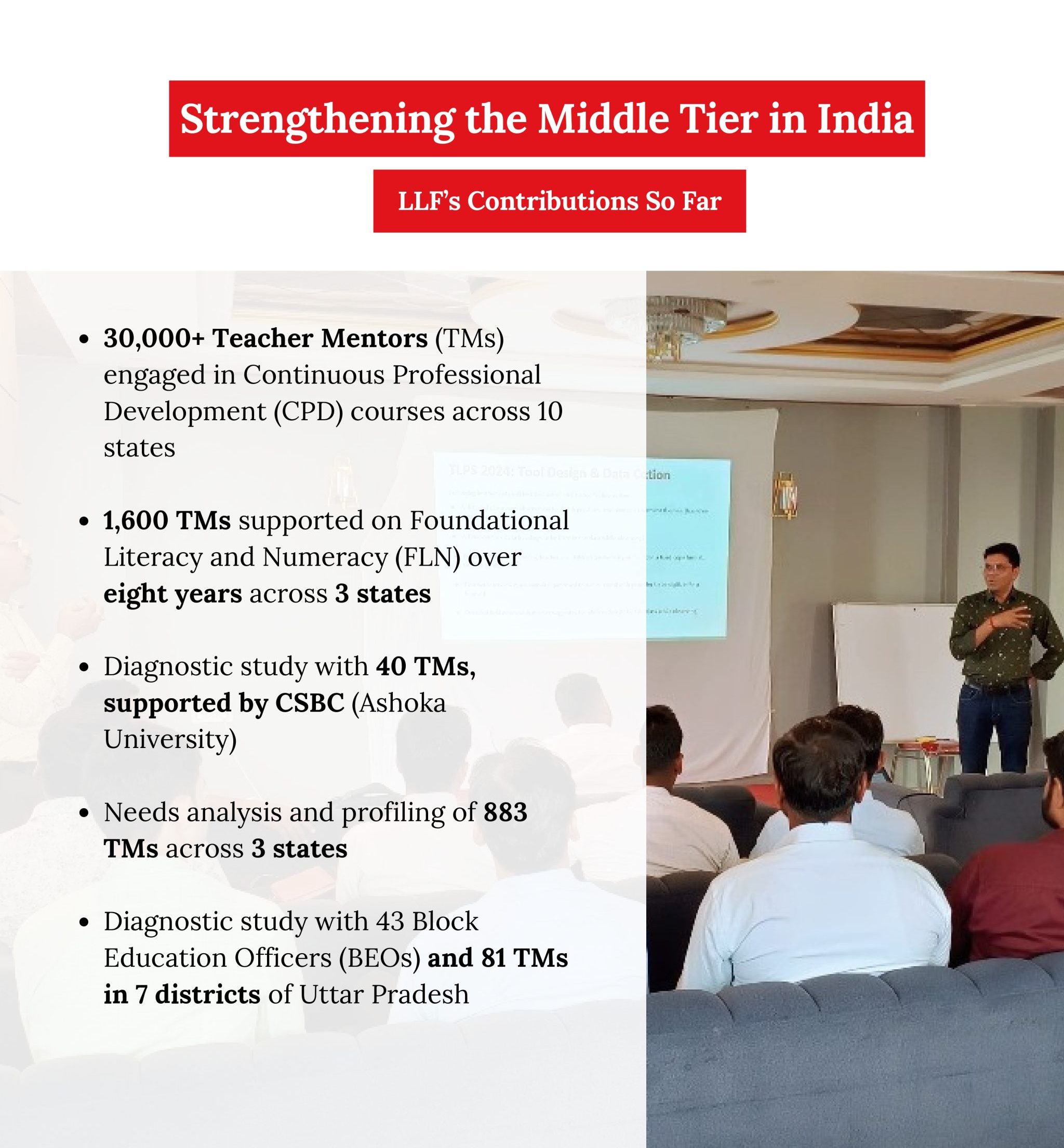
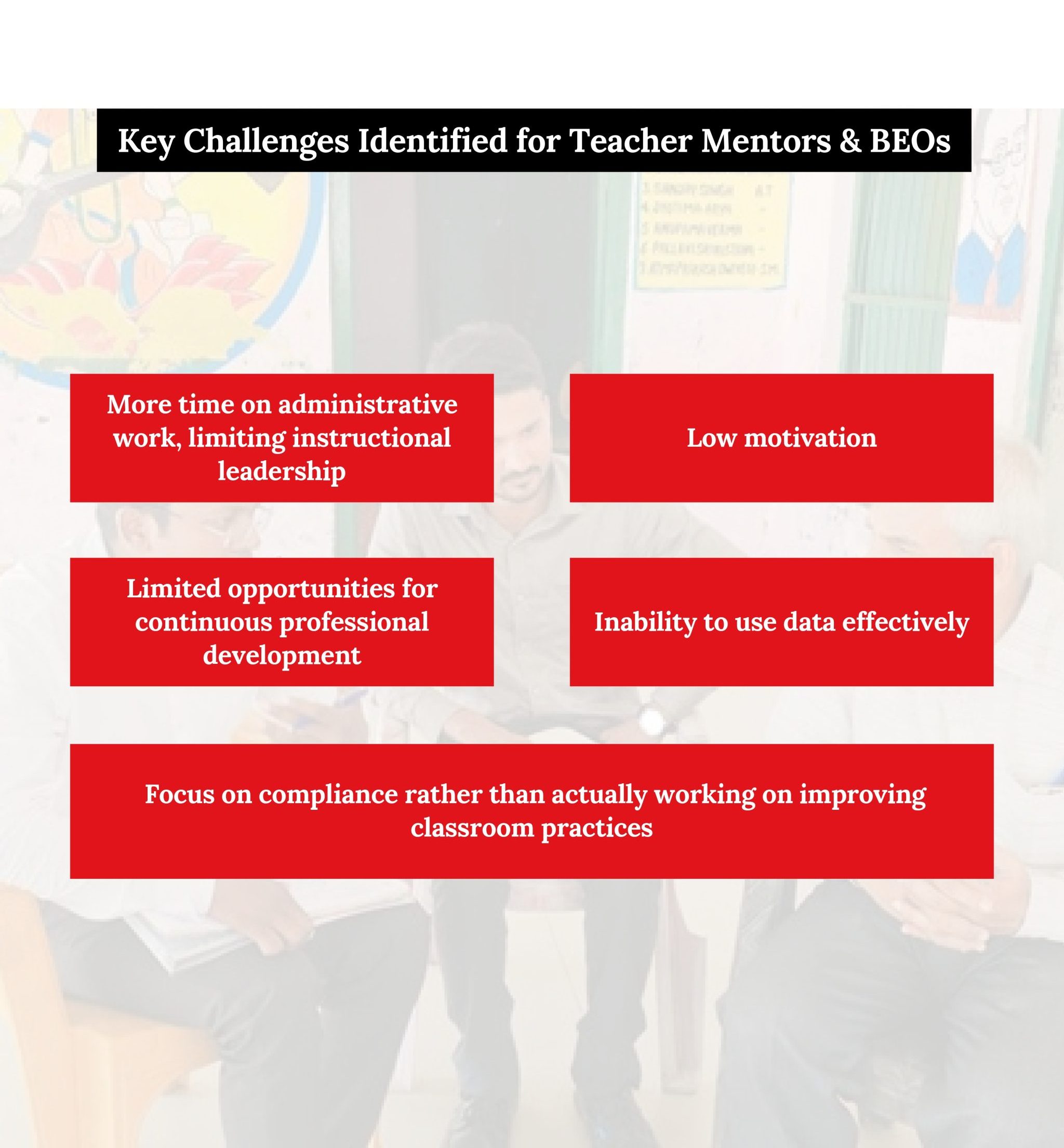
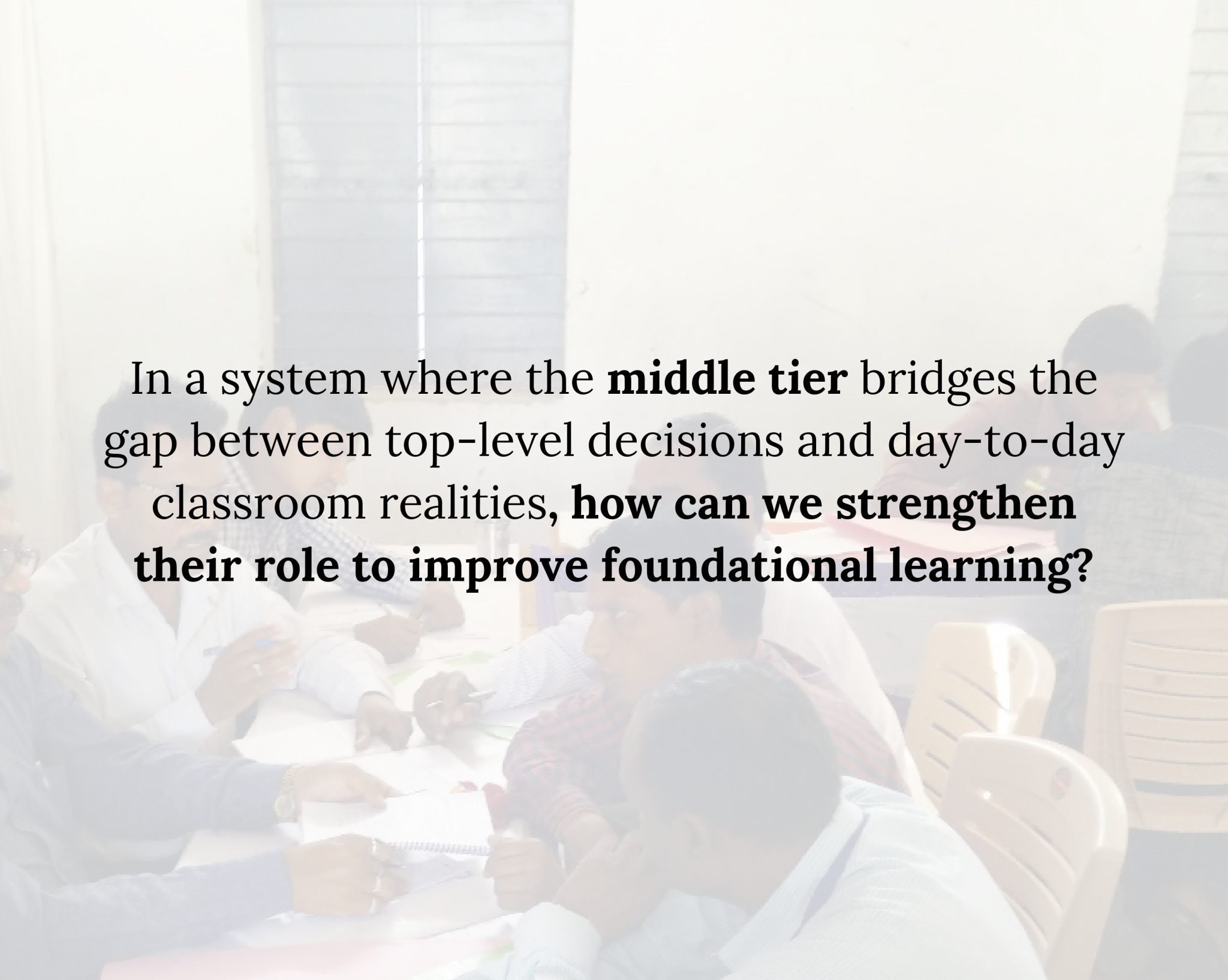
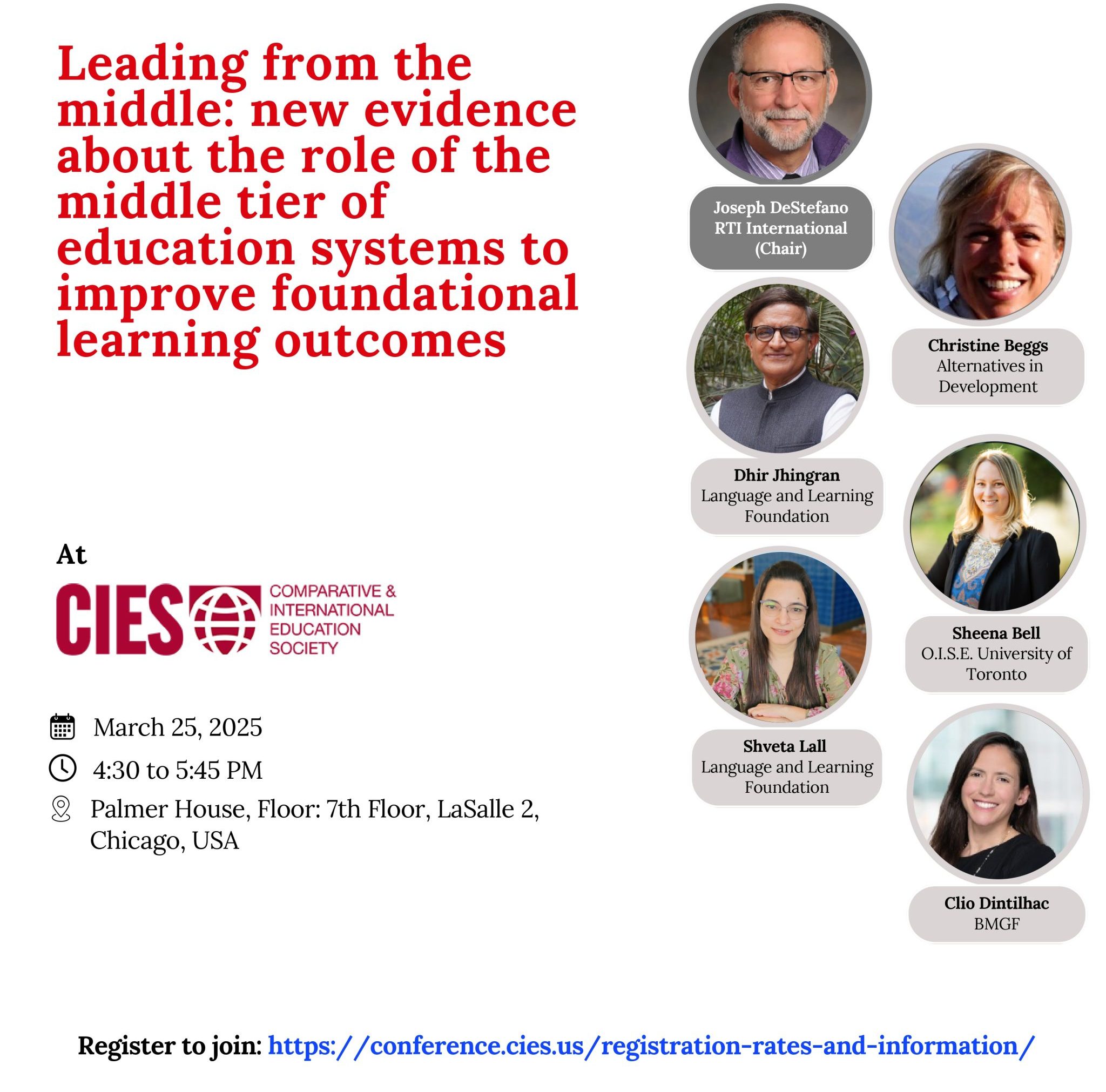
Panelists:
– Joe DeStefano, RTI International (Chair)
– Christine H. Beggs, Alternatives in Development
– Dhir Jhingran, Language and Learning Foundation
– Shveta Lall (Lakhanpal) Language and Learning Foundation
– Clio Dintilhac, Gates Foundation
– Sheena Bell | OISE, University of Toronto
Shifting Systems: Strengthening Foundational Learning through Comprehensive and Contextualised Approaches
Education reform is complex, requiring sustained effort, collaboration, and innovation. At CIES 2025, LLF contributed to a panel discussion on India’s journey in improving Foundational Literacy and Numeracy (FLN) through large-scale government and nonprofit partnerships. This session provided insights into system-wide reforms, digital innovations, and financing models that are shaping FLN outcomes in India.
Key Discussions:
– NIPUN Bharat Mission in Uttar Pradesh – How structured pedagogy, instructional design, and blended teacher training are driving systemic improvements across the state.
– Bridging Learning Gaps – Targeted strategies for revision, reinforcement, and remedial learning to support children at risk of falling behind.
– Outcome-Based Financing in FLN – Lessons from India’s OBF projects and their potential to drive large-scale improvements in student learning and system accountability.
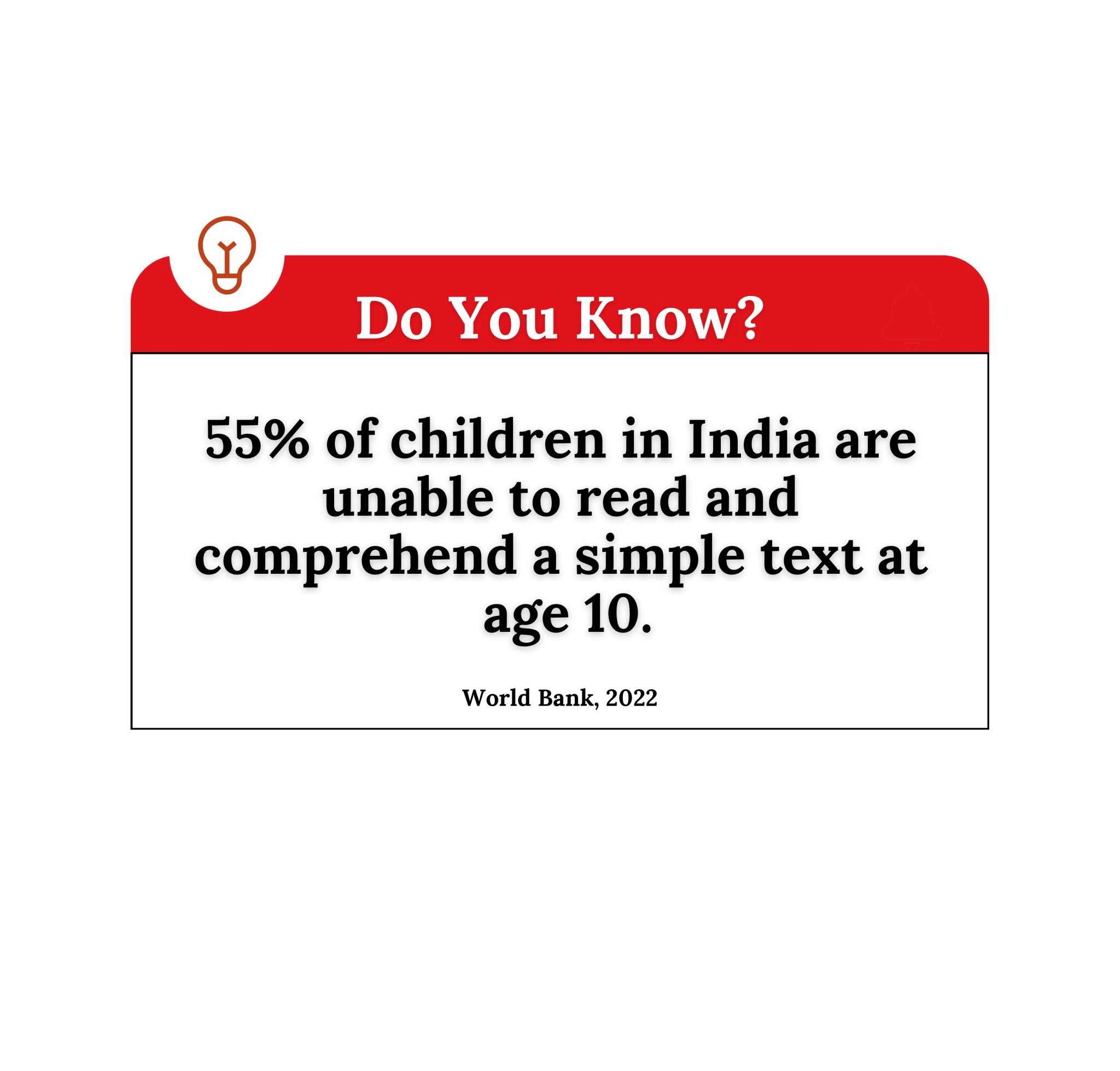
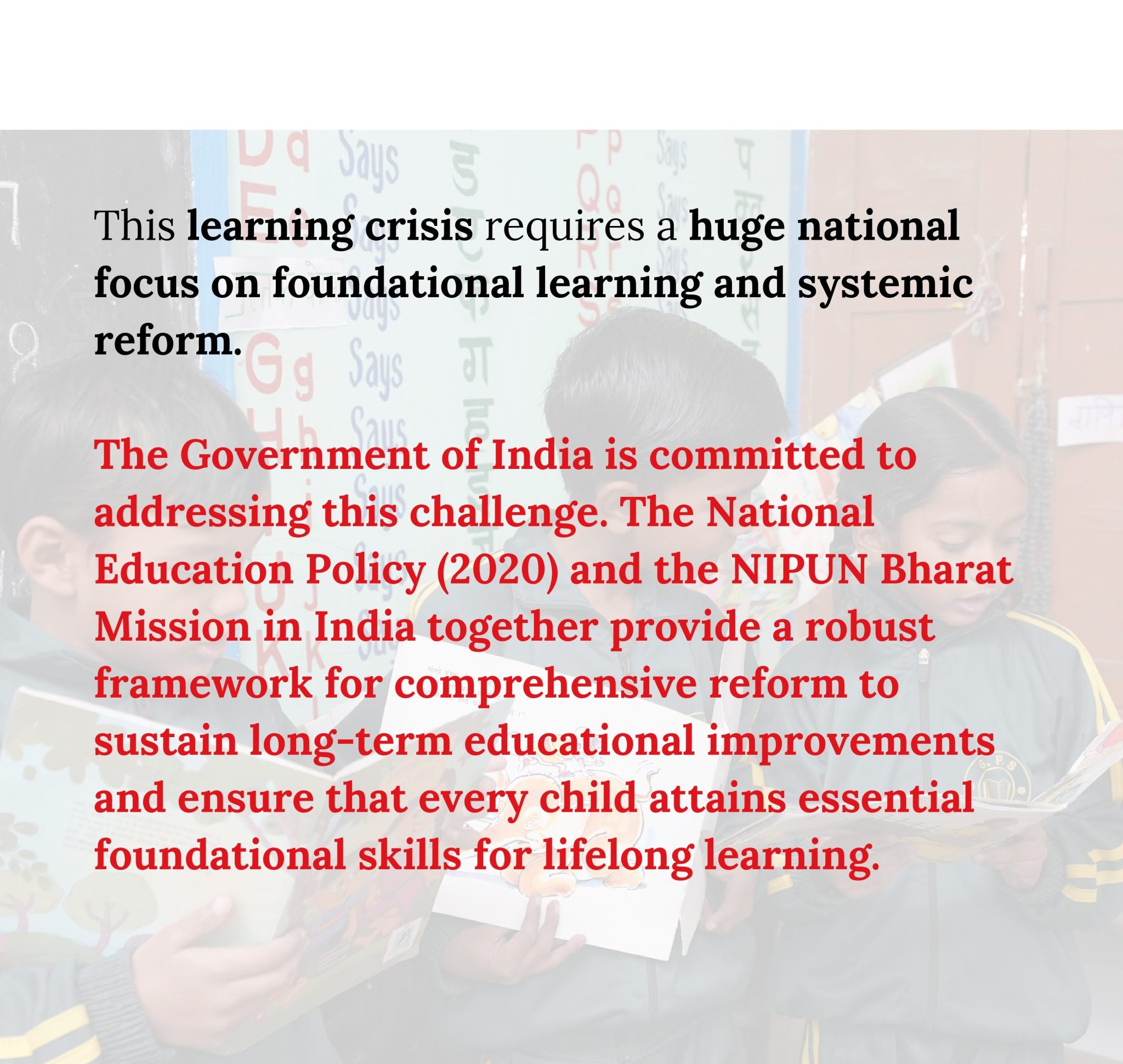
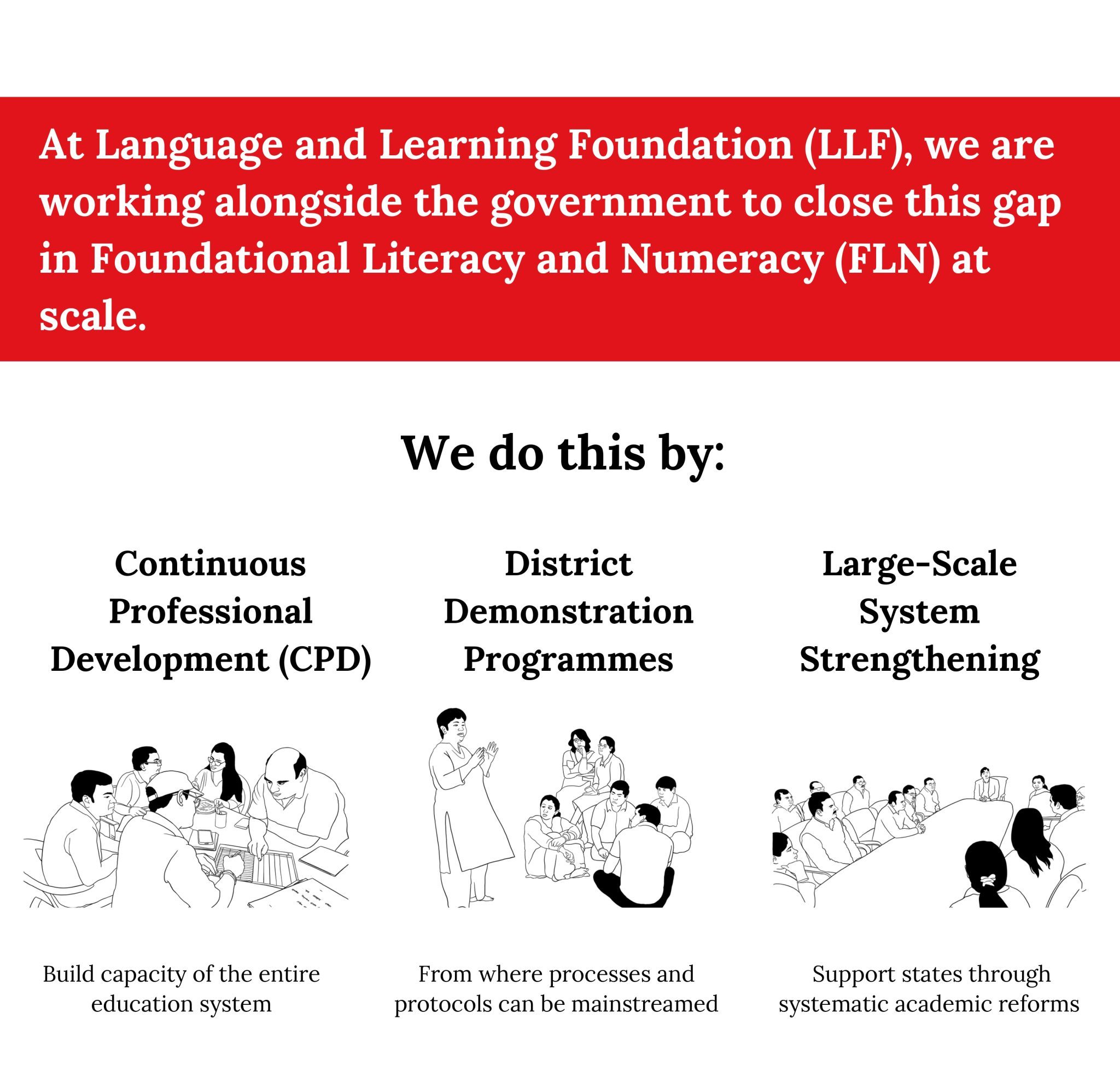
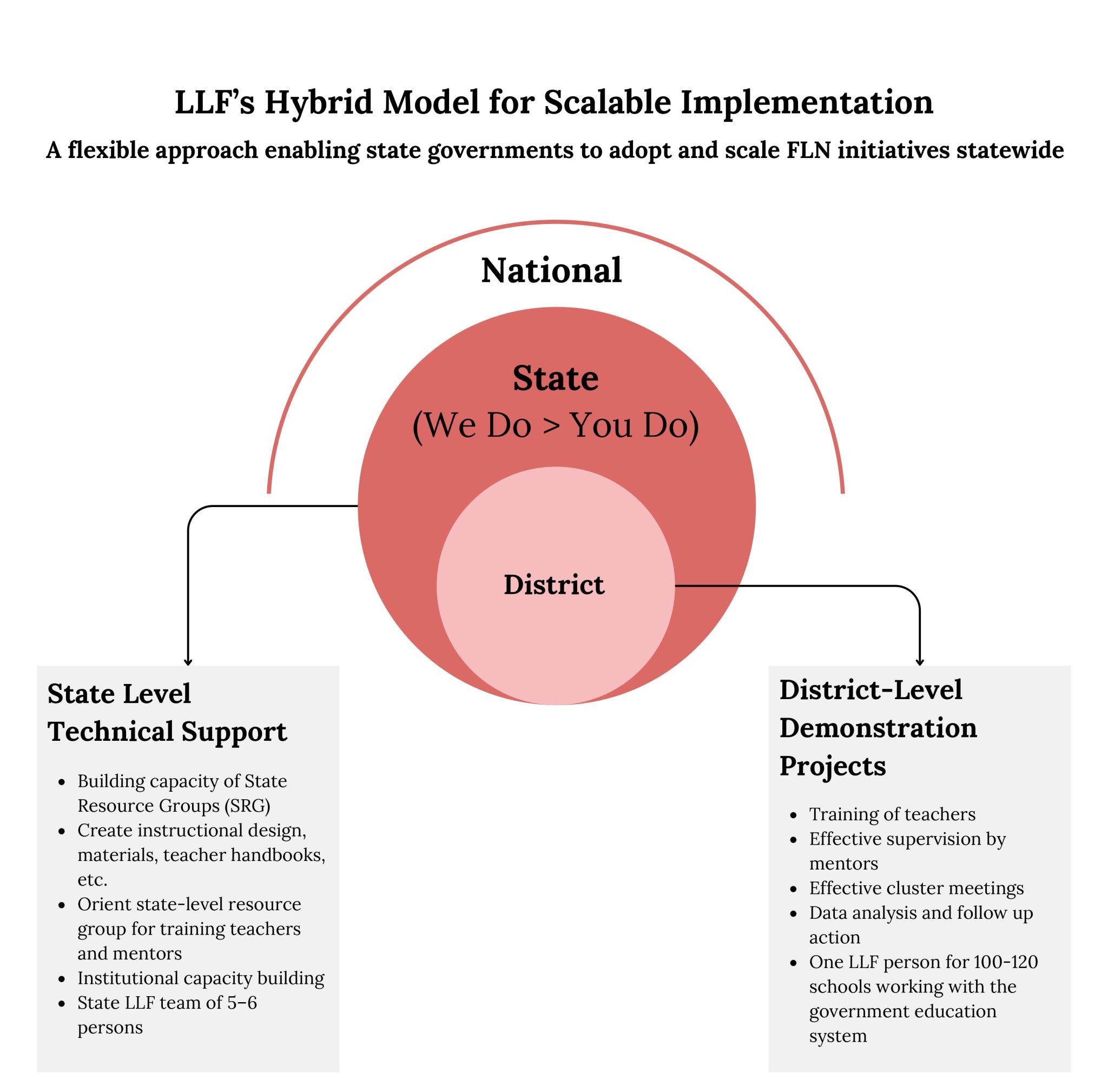
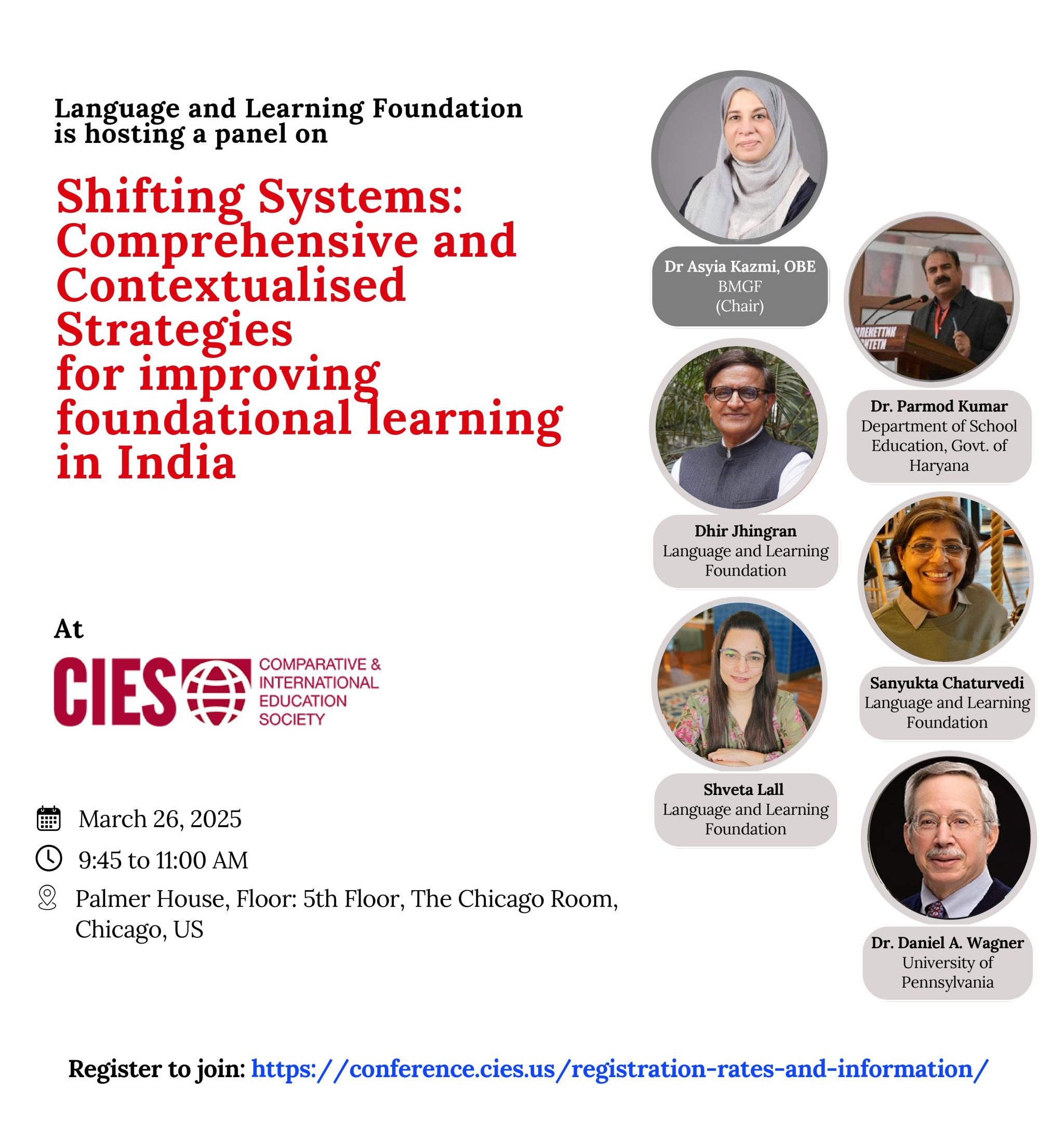
Panelists:
– Dr Asyia Kazmi, OBE, Gates Foundation (Chair)
– Dhir Jhingran, Language and Learning Foundation
– Shveta Lall (Lakhanpal), Language and Learning Foundation
– Dr Parmod Kumar, Department of School Education, Govt. Of Haryana
– Dan Wagner, University of Pennsylvania
– Sanyukta Chaturvedi, Language and Learning Foundation
With case studies from Uttar Pradesh and insights from leading experts, this panel highlighted the critical role of government and nonprofit collaborations in scaling impactful FLN reforms. The discussion offedr valuable lessons for low- and middle-income countries seeking to strengthen their primary education systems.
At CIES 2025, on 24 March
Language and Learning Foundation (LLF) is organising a panel titled “Implementation Science? Decoding the Complexity and Contextual Nature of System Change Work in Large-Scale Government-Non-profit Collaborative Programmes in India.”
Chaired by Benjamin Piper, this panel will attempt to address some of the following questions in the context of large-scale ‘system change’ programmes where non-profits and governments have collaborated in India: What works (or does not work)? Why (what are the reasons it worked, did not work, or worked partly)? For whom (which stakeholders benefited, and what were the outcomes)? What aspects of the programme can be scaled in different contexts?
Key Discussions:
– Strategies for strengthening government systems and policy reform
– Lessons from collaborative partnerships in India and sub-Saharan Africa
– The role of digital interventions in large-scale impact
– How implementation research can deepen understanding of system change
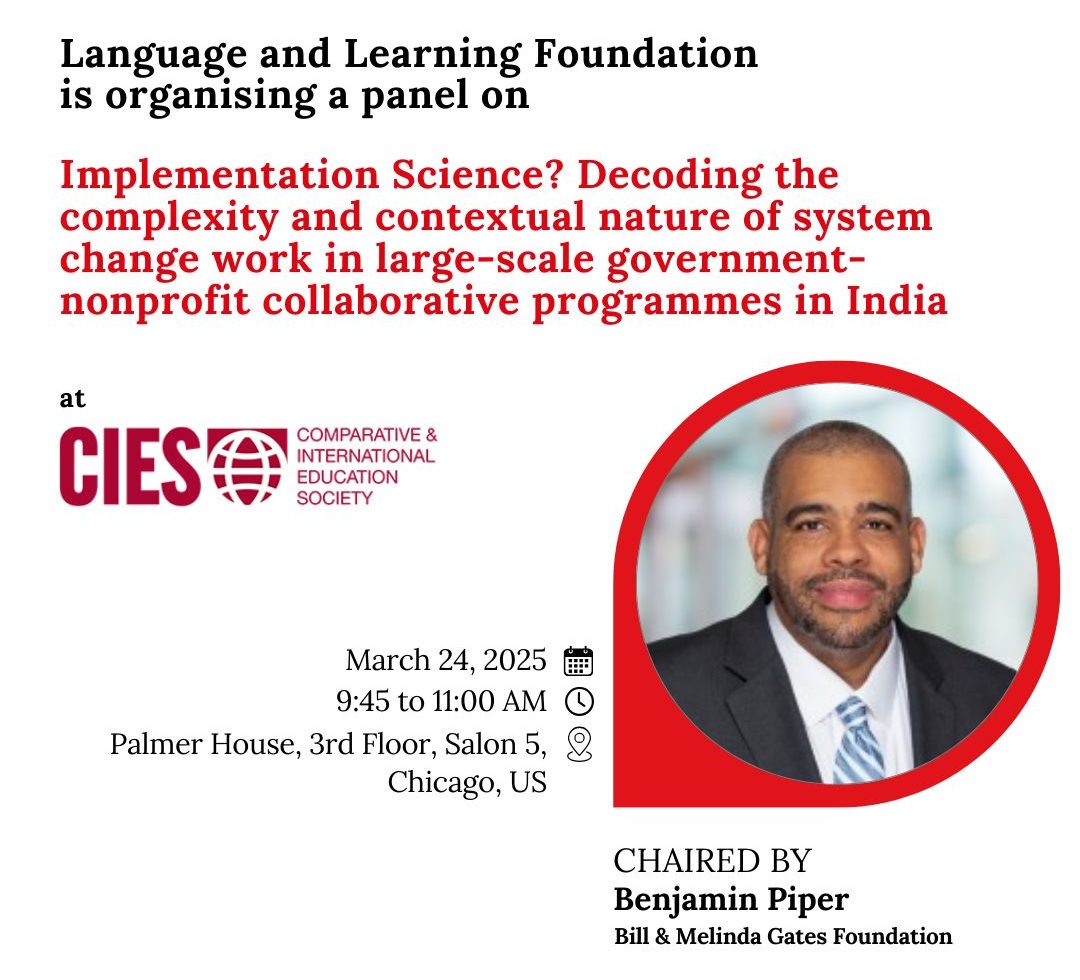
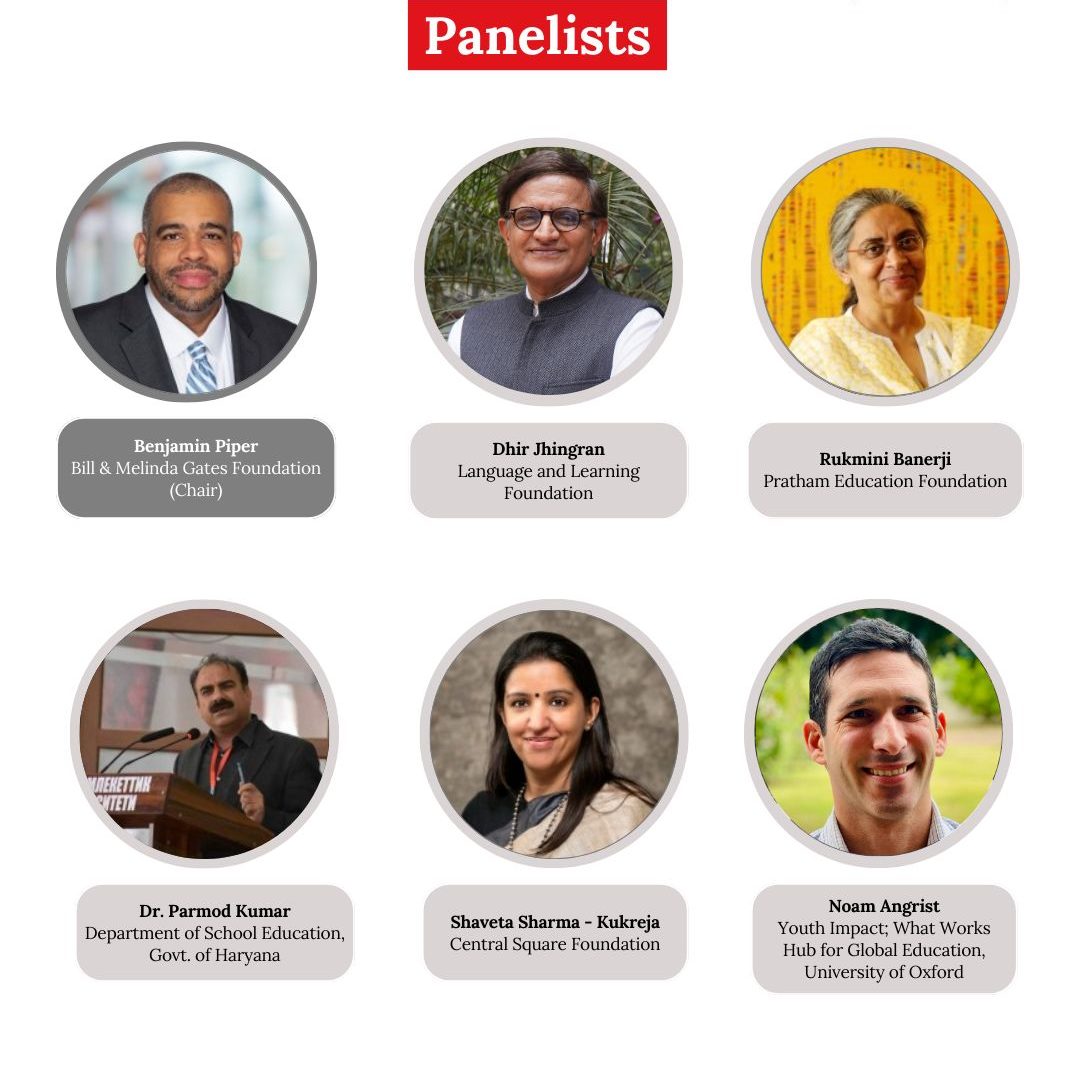
Panelists:
– Benjamin Piper (Chair), Gates Foundation
– Dhir Jhingran, Language and Learning Foundation
– Noam Angrist, Youth Impact; What Works Hub for Global Education, University of Oxford
– Rukmini Banerji, Pratham Education Foundation
– Shaveta Sharma-Kukreja, Central Square Foundation
– Dr Parmod Kumar, Department of School Education, Govt. of Haryana
Events
10th Anniversary Celebrations

On February 27, 2025, with a landmark celebration at The Ashok in New Delhi, LLF celebrated a decade of pioneering work in strengthening Foundational Literacy and Numeracy (FLN) and Multilingual Education (MLE) across India. The celebration was graced with the presence of Chief guest, Shri Dharmendra Pradhan, Hon’ble Minister of Education, Guest of honour, Shri Sanjay Kumar, IAS, Secretary of the Department of School Education & Literacy, and Ms. Vrinda Sarup, Former Secretary of School Education, along with 200 dignitaries from the education sector including partner organisations from corporates and philanthropies.
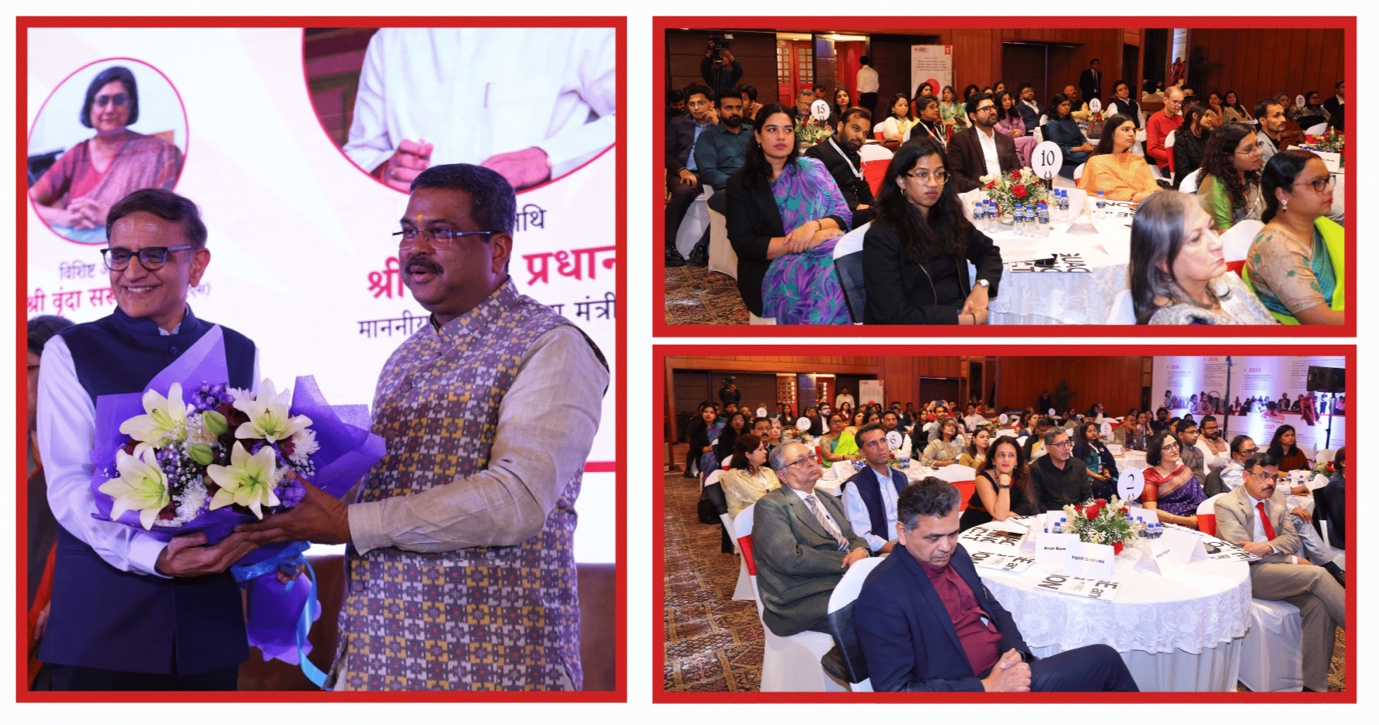
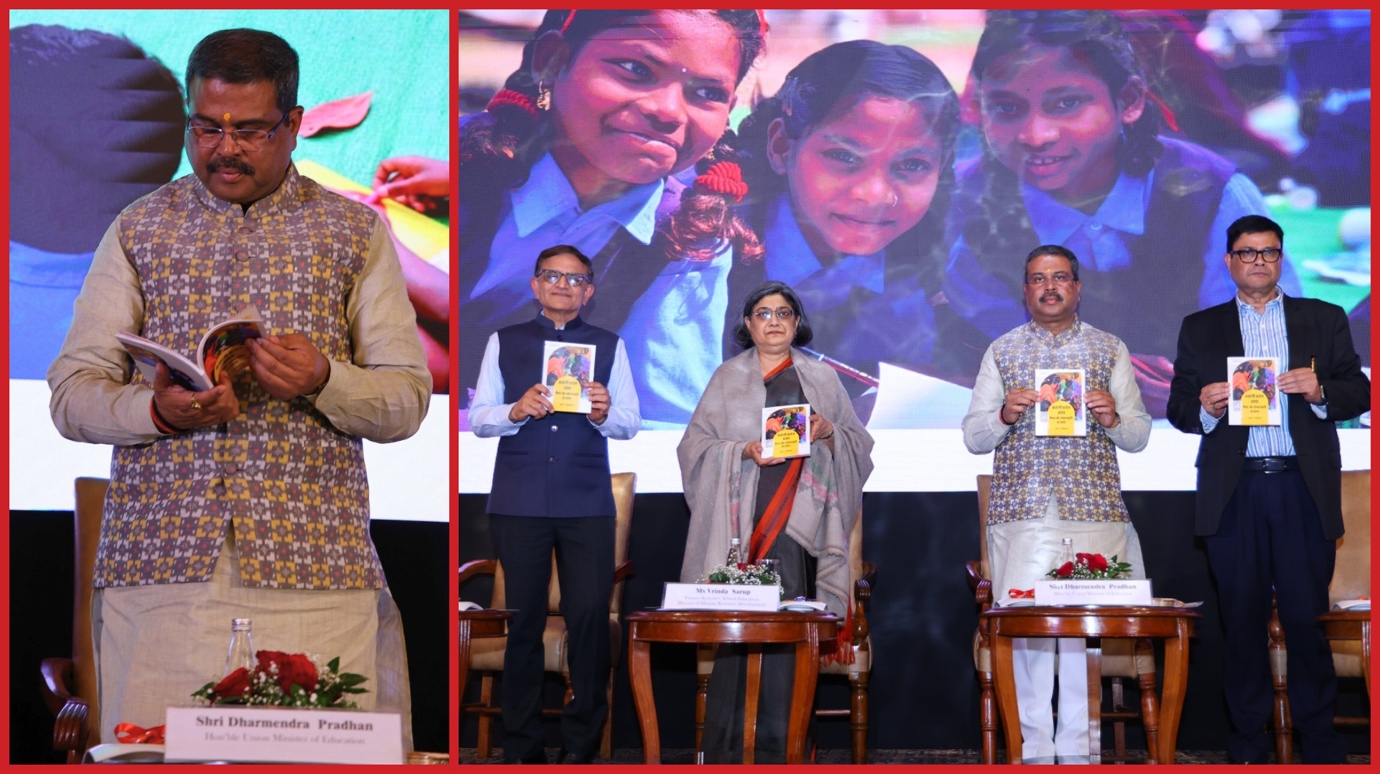
Our 10th anniversary celebration marked a significant achievement in our journey with the launch of several educational initiatives by Hon’ble Education Minister, Shri Dharmendra Pradhan:
- Bilingual Textbooks: Specially developed by LLF in Halbi and Hindi languages for Grades 1 and 2, empowering children to learn in their mother tongue while building regional language skills.
- Storytelling Festival Document: “कहानीकथनउत्सव -िशक्षाऔरलोकसंस्कृितकासंगम” – a unique resource supporting multilingual education in Bastar, Chhattisgarh, that celebrates the beautiful intersection of education and local culture.
- Public Goods Platform: Our new digital resource hub designed to strengthen the FLN ecosystem across India.
LEADERS SPEAK

“India’s multilingualism is our greatest strength—enshrined in our Constitution and championed by Prime Minister Narendra Modi ji—fueling a unity that propels our progress. Under the transformative NEP 2020 and NIPUN Bharat mission, the government is dedicated to ensure that all children master foundational literacy and numeracy skills using a multilingual approach. Just as everyone came together to fight for India’s independence, we all will have to unite and work together for foundational literacy and numeracy .”
— Shri Dharmendra Pradhan, Union Minister of Education of India

“As Language Learning Foundation completes a transformative decade, we reaffirm the NEP 2020’s vision: language is the cornerstone of cognition, creativity, and cultural identity. With India’s linguistic diversity spanning 121 languages being spoken by more than 10,000 people, a multilingual teaching approach is imperative for achieving the NIPUN Bharat goal.”
— Shri Sanjay Kumar, IAS, Secretary, Department of School Education & Literacy, Ministry of Education

“The dedication of LLF, under the leadership of Mr. Dhir Jhingran, is truly commendable. Their outcome-driven approach ensures no compromise on process while maintaining a sharp focus on measurable impact. Their work in multilingual education is particularly significant in enabling children to transition smoothly to the medium of instruction.”
— Ms. Vrinda Sarup, Former Secretary, School Education, Ministry of Human Resource Development
EMPLOYEE RETREAT: CELEBRATING, REFLECTING, RECONNECTING
On 25-26 February 2025, we saw the coming together of 300 team members from 8 states under one roof for the first time. It was a moment to pause, reflect, and reconnect—strengthening the bonds that drive our collective mission in foundational learning.
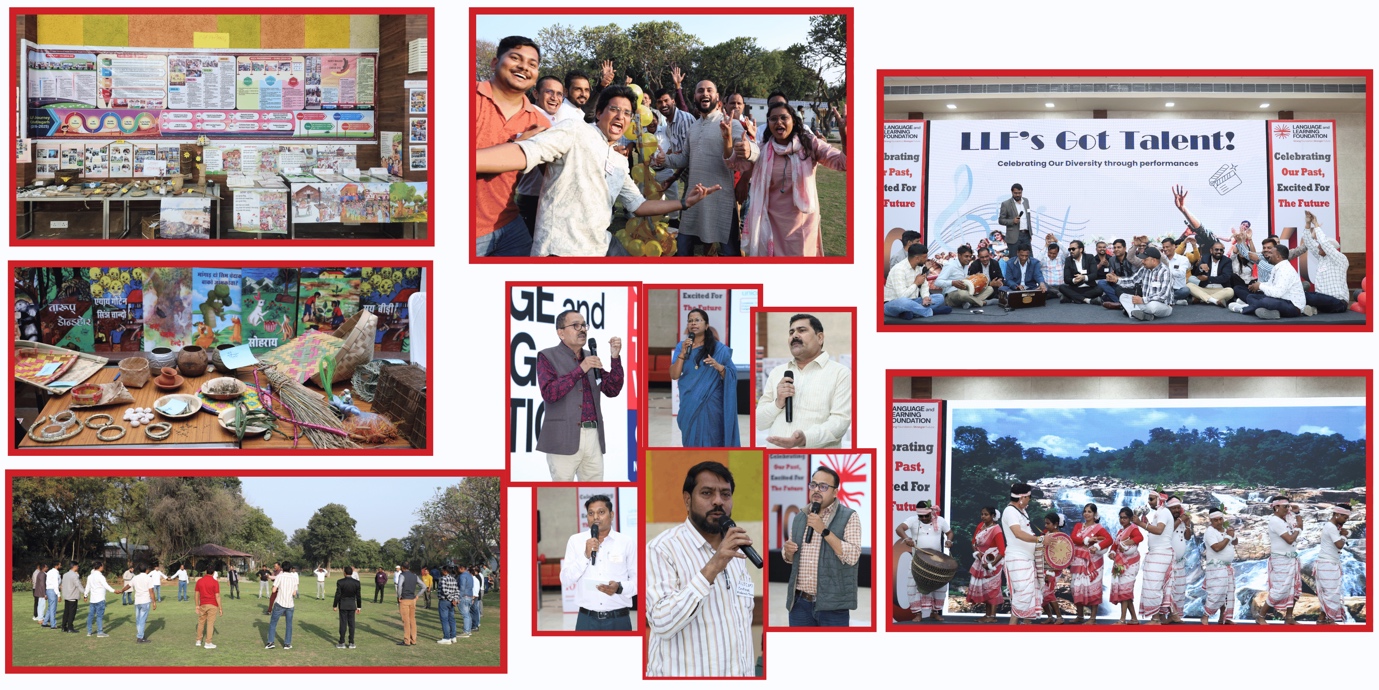
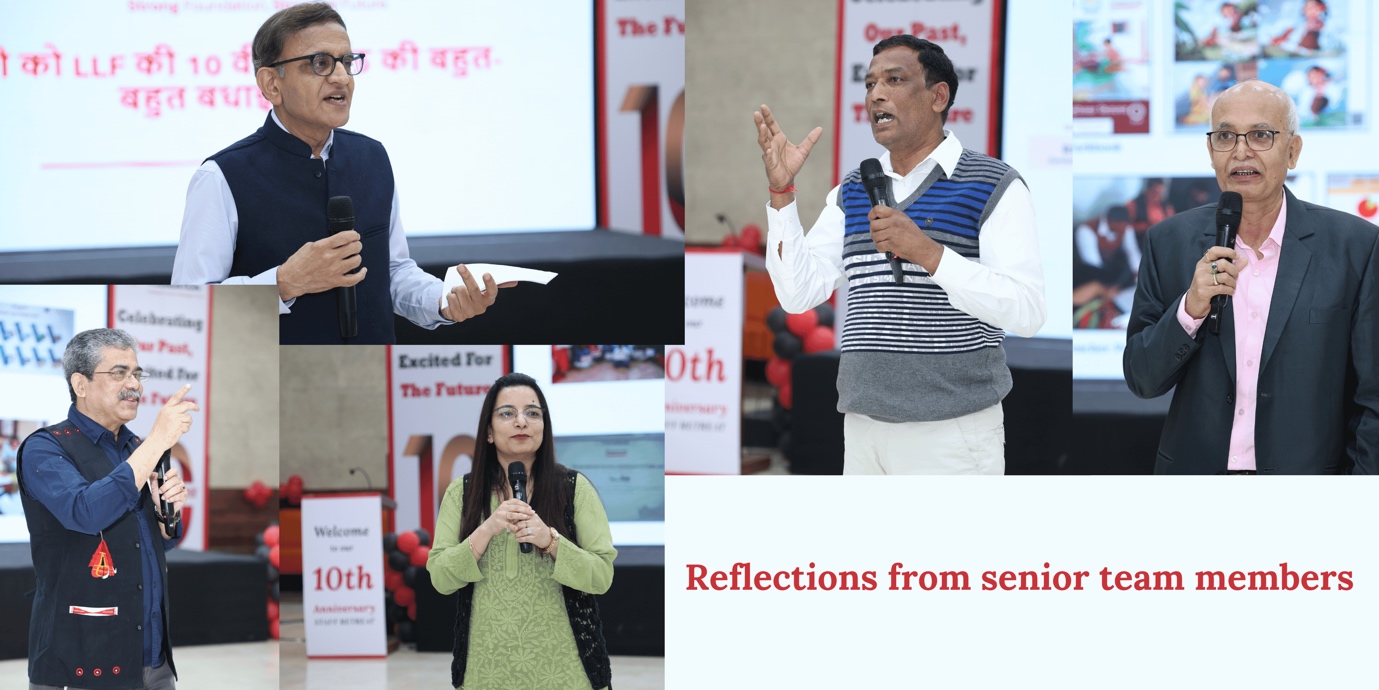

As we move ahead on this journey, we carry this renewed energy forward—united in our vision of a Strong Foundation, Stronger Future for every child.
2030 MISSION
By 2030, we will reach 35 million children by influencing classroom practices of more than 2 million teachers and teacher educators
Your support can help us achieve this mission
